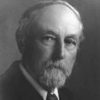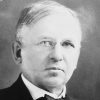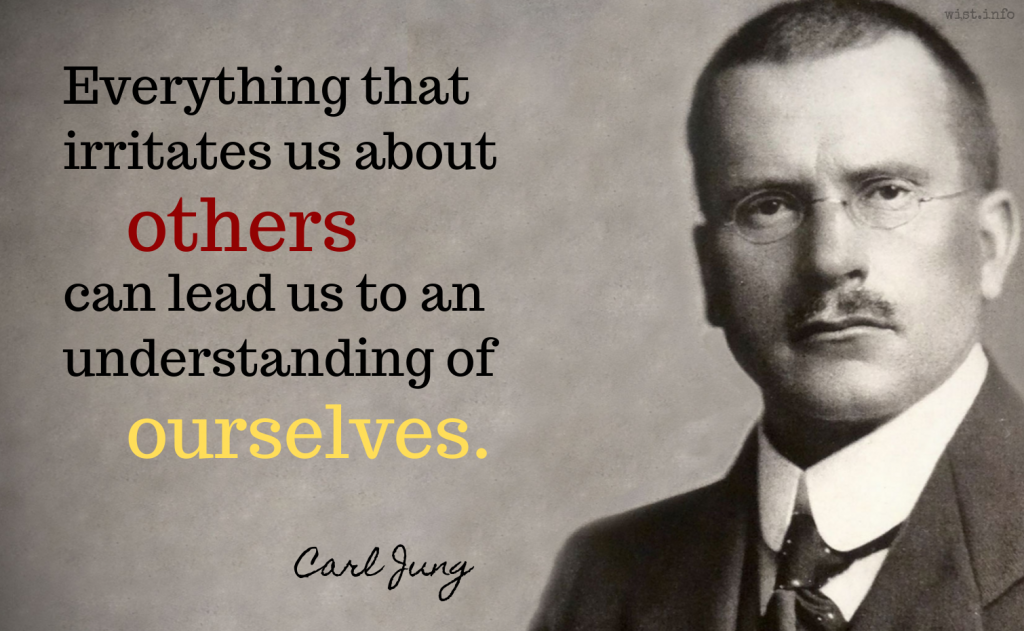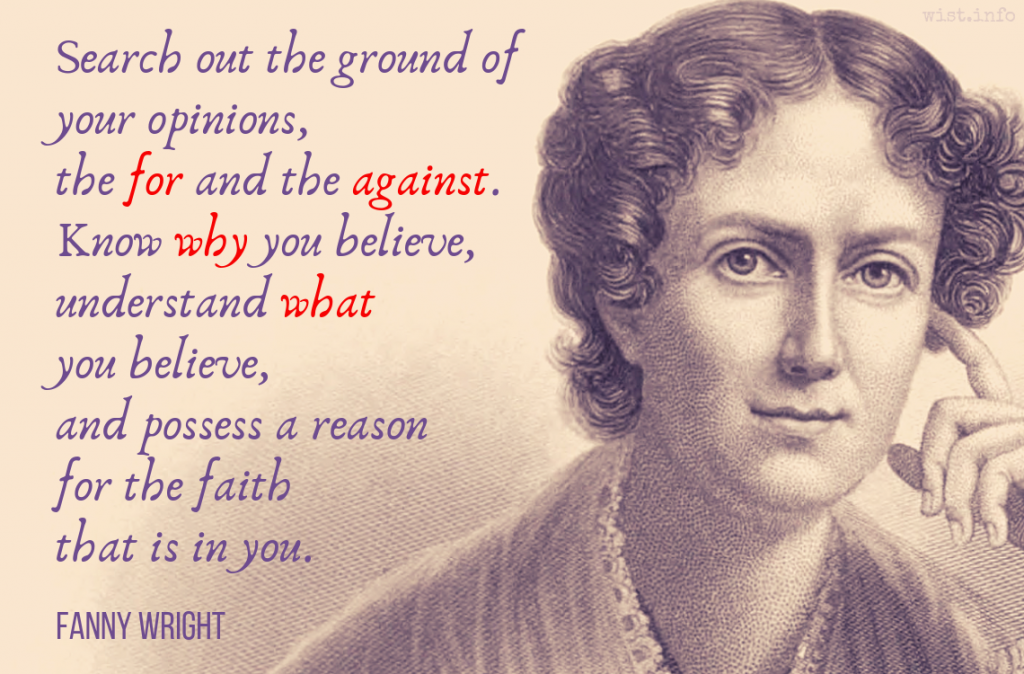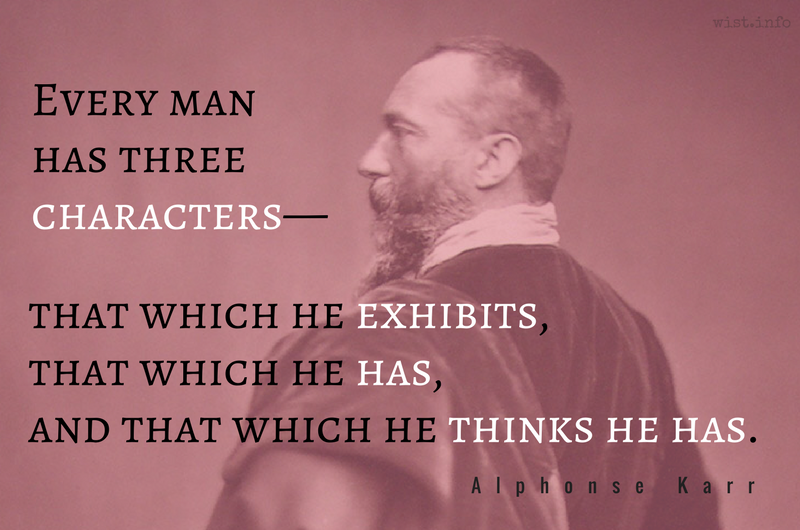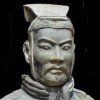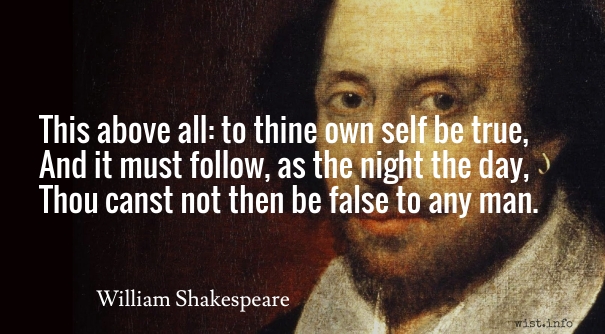Everyone’s shit smells good to himself.
[Stercus cuique suum bene olet.]
Michel de Montaigne (1533-1592) French essayist
Essays, Book 3, ch. 8 (3.8), “Of the Art of Discussion [De l’art de conferer]” (1587) [tr. Screech (1987)]
(Source)
Montaigne is recollecting an adage collected by Desiderius Erasmus in his Adagia (3.4.2, No. 2302). It's actually rendered there as Suus cuique crepitus bene olet. Erasmus maintains that the proverb is not meant literally, but metaphorically (that people value most things that are their own), though he does concede that people are more repulsed by others' excrement than their own.
Montaigne only presents the Latin, not a French translation (as is true with most of his Classical quotations). In context, he uses the phrase regarding how people criticize others for flaws that they, themselves, possess (and even consider virtuous, in their own cases).
I have also seen a version of this cited as an Icelandic proverb.
This essay (and passage) first appeared in the 2nd (1588) edition.
(Source (Latin)). Alternate translations:Ev’ry mans ordure well,
To his owne sense doth smell.
[tr. Florio (1603)]To each one their own manure smells good.
[tr. Cotton/Hazlitt (1877)]Every man's filth smells sweet to himself.
[tr. Ives (1925)]Each man likes best the smell of his own dung.
[tr. Zeitlin (1934)]Every man likes the smell of his own dung.
[tr. Frame (1943)]Every man's filth smells sweet to him.
[tr. Cohen (1958)]Everyone thinks his own fart smells sweet.
[tr. Drysdall (2001); of Erasmus]
Quotations about:
self-awareness
Note not all quotations have been tagged, so Search may find additional quotes on this topic.
Most people are not even aware of their need to conform. They live under the illusion that they follow their own ideas and inclinations, that they are individualists, that they have arrived at their opinions as the result of their own thinking — and that it just happens that their ideas are the same as those of the majority. The consensus of all serves as a proof for the correctness of “their” ideas.
Erich Fromm (1900-1980) American psychoanalyst and social philosopher
The Art of Loving, ch. 2 (1956)
(Source)
“Wait a moment,” said Winnie-the-Pooh, holding up his paw.
He sat down and thought, in the most thoughtful way he could think. Then he fitted his paw into one of the Tracks … and then he scratched his nose twice, and stood up.
“Yes,” said Winnie-the-Pooh.
“I see now,” said Winnie-the-Pooh.
“I have been Foolish and Deluded,” said he, “and I am a Bear of No Brain at All.”A. A. Milne (1882-1956) English poet and playwright [Alan Alexander Milne]
Winnie-the-Pooh, ch. 3 “Pooh and Piglet Go Hunting” (1926)
(Source)
Now I laugh at my fear of analysis. Most people’s possession of knowledge deprives them of the sense of wonder, but such a sense of wonder and mystery is like the savage’s fear of mysterious fire until he discovers the principle of it and the mastering of it. I say that after we know all there is to know, there is still mystery and wonder of a deeper kind.
Anaïs Nin (1903-1977) Catalan-Cuban-French author, diarist
Diary (1932-11-27)
(Source)
Source of the more commonly encountered paraphrase (e.g.):I have no fear of clarity. The possession of knowledge does not kill the sense of wonder and mystery. There is always more mystery. I have no fear of analysis. The possession of knowledge does not destroy the sense of wonder and mystery.
Dare not to be guilty of ill Things, tho’ thou wert sure to be secret and unpunished. Conscience will sit upon it, and that is Witness, Jury, Judge, and Executioner.
Thomas Fuller (1654-1734) English physician, preacher, aphorist, writer
Introductio ad Prudentiam, Vol. 2, # 2216 (1727)
(Source)
Dig within. There lies the well-spring of good: ever dig, and it will ever flow.
[Ἔνδον σκάπτε, ἔνδον ἡ πηγὴ τοῦ ἀγαθοῦ καὶ ἀεὶ ἀναβλύειν δυναμένη, ἐὰν ἀεὶ σκάπτῃς.]
Marcus Aurelius (AD 121-180) Roman emperor (161-180), Stoic philosopher
Meditations [To Himself; Τὰ εἰς ἑαυτόν], Book 7, ch. 59 (7.59) (AD 161-180) [tr. Staniforth (1964)]
(Source)
On how to turn accidents and misfortune into learning experiences and behavior he will approve of in himself.
(Source (Greek)). Alternate translations:Look within; within is the fountain of all good. Such a fountain, where springing waters can never fail, so thou dig still deeper and deeper.
[tr. Casaubon (1634), 7.31]Look Inwards, and turn over your self; For you have a lasting Mine of Happiness at home, if you will but Dig for't.
[tr. Collier (1701), 7.60]Look inwards; within is the fountain of good; which is ever springing up, if you be always digging in it.
[tr. Hutcheson/Moor (1742)]Look into your own bosom; for you have there a fountain of happiness, if you will searcyh for it, and suffer it to flow without interruption.
[tr. Graves (1792), 7.52]Look within. Within is the fountain of good, and it will ever bubble up, if thou wilt ever dig.
[tr. Long (1862)]Look inwards, for you have a lasting fountain of happiness at home that will always bubble up if you will but dig for it.
[tr. Collier/Zimmern (1887)]Dig within. Within is the fountain of good; ever dig, and it will ever well forth water.
[tr. Rendall (1898)]Look inward. Within is the fountain of Good. Dig constantly and it will ever well forth.
[tr. Hutcheson/Chrystal (1902)]Look within. Within is the fountain of Good, ready always to well forth if thou wilt always delve.
[tr. Haines (Loeb) (1916)]Delve within; within is the fountain of good, and it is always ready to bubble up, if you always delve.
[tr. Farquharson (1944)]Dig within; for within you lies the fountain of good, and it can always be gushing forth if only you always dig.
[tr. Hard (1997 ed.)]Dig deep; the water -- goodness -- is down there. And as long as you keep digging, it will keep bubbling up.
[tr. Hays (2003)]Dig inside yourself. Inside there is a spring of goodness ready to gush at any moment, if you keep digging.
[tr. Hammond (2006)]Turn your attention within, for the fountain of all that is good lies within, and it is always ready to pour forth, if you continually delve in.
[tr. Needleman/Piazza (2008)]Dig within; for within you lies the fountain of good, and it can always be gushing forth if only you always dig.
[tr. Hard (2011 ed.)]Search inside yourself; inside you is the fountain of goodness, and it continues to surge as long as you search.
[ed. Taplin (2016)]
The fate of individual human beings may not now be connected in a deep way with the rest of the universe, but the matter out of which each of us is made is intimately tied to processes that occurred immense intervals of time and enormous distances in space away from us. Our Sun is a second- or third-generation star. All of the rocky and metallic material we stand on, the iron in our blood, the calcium in our teeth, the carbon in our genes were produced billions of years ago in the interior of a red giant star. We are made of star-stuff.
Carl Sagan (1934-1996) American scientist and writer
The Cosmic Connection: An Extraterrestrial Perspective, ch. 26 (1973)
(Source)
Sagan riffed off the "star-stuff" theme during his 1980 PBS TV series, Cosmos, ep. 9:The Cosmos was originally all hydrogen and helium. Heavier elements were made in red giants and supernovas, and then blown off into space, where they were available for subsequent generations of stars and planets. Our sun is probably a 3rd generation star. Except for hydrogen and helium, every atom in the Sun and the Earth was synthesized in other stars. The silicon in the rocks, the oxygen in the air, the carbon in our DNA, the gold in our banks, the uranium in our arsenals, were all made thousands of light years away and billions of years ago. Our planet, our society, and we ourselves, are built of star-stuff.
In the companion book for the series, chapter 9, he included this variation:All the elements of the Earth except hydrogen and some helium have been cooked by a kind of stellar alchemy billions of years ago in stars, some of which are today inconspicuous white dwarfs on the other side of the Milky Way Galaxy. The nitrogen in our DNA, the calcium in our teeth, the iron in our blood, the carbon in our apple pies were made in the interiors of collapsing stars. We are made of starstuff.
He also included this phrase toward the end of the TV series (specific episode unknown):Because the cosmos is also within us. We're made of star-stuff. We are a way for the universe to know itself.
A dozen years later, D. C. Fontana combined these thoughts in her script for Babylon 5, 2x04 "A Distant Star" [Prod. 204] (1994-11-16):DELENN: The molecules of your body are the same molecules that make up this station, and the nebula outside, that burn inside the stars themselves. We are star-stuff, we are the universe made manifest, trying to figure itself out.
These illustrations suggest four general maxims, which will prove an adequate preventative of persecution mania if their truth is sufficiently realized. The first is: remember that your motives are not always as altruistic as they seem to yourself. The second is: Don’t overestimate your own merits. The third is: don’t expect others to take as much interest in you as you do yourself. And the fourth is: don’t imagine that most people give enough thought to you to have any desire to persecute you.
Bertrand Russell (1872-1970) English mathematician and philosopher
Conquest of Happiness, Part 1, ch. 8 “Persecution Mania” (1930)
(Source)
No satisfaction based upon self-deception is solid, and, however unpleasant the truth may be, it is better to face it once for all, to get used to it, and to proceed to build your life in accordance with it.
Bertrand Russell (1872-1970) English mathematician and philosopher
Conquest of Happiness, Part 1, ch. 8 “Persecution Mania” (1930)
(Source)
Thou never wast so good as thou shouldest be; if thou does not strive to be better. And thou never wilt be better, if thou doest not fear to grow worse.
Thomas Fuller (1654-1734) English physician, preacher, aphorist, writer
Introductio ad Prudentiam, Vol. 2, # 2092 (1727)
(Source)
I think it iz good taste, and also good judgement, when a man prays for the sins ov the people, that he should count himself in.
[I think it is good taste, and also good judgement, when a man prays for the sins of the people, that he should count himself in.]
Josh Billings (1818-1885) American humorist, aphorist [pseud. of Henry Wheeler Shaw]
Josh Billings’ Farmer’s Allminax, 1876-01 (1876 ed.)
(Source)
This showed up again in the Allminax entry for 1878-01:I allwuss think that it is good taste, and pretty good religion too, when a man prays for the sins ov the people, to count himself in.
[I always think that it is good taste, and pretty good religion, too, when a man prays for the sins of the people, to count himself in.]
In the British Wit and Wisdom of Josh Billings (1913) [ed. H. Montague], this is given (with standard spelling):I always did think that it was good taste and pretty good religion too, when a man prayed for the SINS of other folks, to include himself also.
Merely to realize the causes of one’s own envious feelings is to take a long step towards curing them. The habit of thinking in terms of comparison is a fatal one.
As a horse when he has run, a dog when he has tackled the game, a bee when it has made the honey, so a man when he has done a good act does not call out for others to come and see, but he goes on to another act, as a vine goes on to produce again the grapes in season.
[ἵππος δραμών, κύων ἰχνεύσας, μέλισσα μέλι ποιήσασα, ἄνθρωπος δ̓ εὖ ποιήσας οὐκ ἐπιβοᾶται, ἀλλὰ μεταβαίνει ἐφ̓ ἕτερον, ὡς ἄμπελος ἐπὶ τὸ πάλιν ἐν τῇ ὥρᾳ τὸν βότρυν ἐνεγκεῖν.]
Marcus Aurelius (AD 121-180) Roman emperor (161-180), Stoic philosopher
Meditations [To Himself; Τὰ εἰς ἑαυτόν], Book 5, ch. 6 (5.6) (AD 161-180) [tr. Long (1862)]
(Source)
(Source (Greek)). Alternate translations:As a horse after a race, and a hunting dog when he hath hunted, and a bee when she hath made her honey, look not for applause and commendation; so neither doth that man that rightly doth understand his own nature when he hath done a good turn: but from one doth proceed to do another, even as the vine after she hath once borne fruit in her own proper season, is ready for another time.
[tr. Casaubon (1634)]A Fleet Horse or Greyhound, don't use to make a Noise when they have perform'd handsomly, nor a Bee neither when she has made a little Hony: And thus a Man that's rightly Kind, never proclaims a Good Turn, but does another as soon as he can; just like a Vine that bears again the next Season.
[tr. Collier (1701)]The horse, when he hath run his course, the hound, when he has followed the track, the bee, when it has made its honey, and the Man, when he hath done good to others, don’t make a noisy boast of it, but go on to repeat the like actions, as the vine in its season produces its new clusters again.
[tr. Hutcheson/Moor (1742)]This same is applicable to the horse that has finished his course, to the hound that has ended his chase, and to the bee that has produced its honey. Let the man, then, who has done a beneficent action, not look for applause; but repeat it the first opportunity; as the vine again yields its fruit at the proper season.
[tr. Graves (1792), 5.5]A fleet horse or greyhound do not make a noise when they have done well, nor a bee neither when she has made a little honey. And thus a man that has done a kindness never proclaims it, but does another as soon as he can, just like a vine that bears again the next season.
[tr. Collier/Zimmern (1887)]As the horse that runs, the hound that hunts, the bee that hives its honey, so the man who does the kindness does not raise a shout, but passes on to the next act, as a vine to the bearing of clusters for next season.
[tr. Rendall (1898)]The horse when he has run his course, the hound when he has followed the track, the bee when it has made its honey, and the man when he has done good to others, make no noisy boast of it, but set out to do the same once more, as the vine in its season produces its new clusters again.
[tr. Hutcheson/Chrystal (1902)][...] a steed when it has run its course, a hound when it has singled out the trail, a bee when she hath made her comb. And so a man when he hath done one thing well, does not cry it abroad, but betakes himself to a second, as a vine to bear afresh her clusters in due season.
[tr. Haines (Loeb) (1916)]A horse runs, a hound tracks, bees make honey, and a man does good, but doesn't know that he has done it and passes on to a second act, like a vine to bear once more its grapes in due season.
[tr. Farquharson (1944)][...] a horse that has run its race, a hound that has tracked his quarry, or a bee that has hived her honey. Like them, the man who has done one good action does not cry it aloud, but passes straight on to a second, as the vine passes on to the bearing of another summer's grapes.
[tr. Staniforth (1964)][...] a horse when it has run its race, or a dog when it has followed a trail, or a bee when it has mades its honey. And so such a person, when he has done a good deed, does not cry it abroad, but passes straight on to the next, as the vine yields new clusters of grapes when the season comes around.
[tr. Hard (1997 ed.)]A horse at the end of the race ...
A dog when the hunt is over ...
A bee with its honey stored ...
And a human being after helping others.
They don't make a fuss about it. They just go on to something else, as the vine looks forward to bearing fruit again in season.
[tr. Hays (2003)]A horse that has raced, a dog that has tracked, a bee that has made honey, and a man that has done good -- none of these knows what they have done, but they pass on to the next action, just as the vine passes on to bear grapes again in due season.
[tr. Hammond (2006)][...] a horse when it has run its race, or a dog when it has followed its trail, or a bee when it has made its honey. And so such a person, when he has done a good deed, does not shout about it, but passes straight on to the next one, as the vine yields new clusters of grapes when the season comes around.
[tr. Hard (2011 ed.)][...] a horse which has run a race, a dog which has followed the scent, or a bee which has made its honey. A person who has done something good does not make a big fuss about it, but goes on to the next action, as a vine goes on to produce grapes again in season.
[tr. Gill (2013), sec. 3-4]A man does not proclaim a good deed, but proceeds to another, as a vine bears grapes again in season.
[ed. Taplin (2016)]
Though thou art too much a man to be without all Passion; yet thou art not to be so much a Beast, as to be governed by it.
Thomas Fuller (1654-1734) English physician, preacher, aphorist, writer
Introductio ad Prudentiam, Vol. 2, # 2000 (1727)
(Source)
LAWRENCE: I — killed — two people, I mean two Arabs. One was a boy — this was yesterday. … I led him into a quicksand. The other was a man — that was, oh let me see — before Akaba anyway — I had to execute him with my pistol. … There was something about it I didn’t like.
ALLENBY: Well, naturally.
LAWRENCE: No. Something else.
ALLENBY: I see. Well that’s all right. Let it be a warning.
LAWRENCE: No. Something else.
ALLENBY: What then?
LAWRENCE: I enjoyed it.
Robert Bolt (1924-1995) English dramatist
Lawrence of Arabia, Part 1, sc. 621-623 (1962) [with Michael Wilson]
(Source)
The above is from the Bolt shooting script. The actual movie sequence has slightly different language and intonation in Lawrence's first line:I killed two people, I mean, two Arabs. One was a boy. That was -- yesterday. I led him into a quicksand. The other was a man. That was -- before Aqaba, anyway. I had to execute him with my pistol. There was something about it I didn't like.
Thy greatest Wisdom consists in being acquainted with thy own Follies.
Thomas Fuller (1654-1734) English physician, preacher, aphorist, writer
Introductio ad Prudentiam, Vol. 2, # 1882 (1727)
(Source)
We are never nearer right than we am when we fear we are rong.
[We are never nearer right than we are when we fear we are wrong.]
Josh Billings (1818-1885) American humorist, aphorist [pseud. of Henry Wheeler Shaw]
Everybody’s Friend, Or; Josh Billing’s Encyclopedia and Proverbial Philosophy of Wit and Humor, ch. 156 “Affurisms: Embers on the Harth” (1874)
(Source)
It’s a damn sight simpler to criticize other people’s ideas than it is to set forth your own. One is never in so much danger of making an ass of one’s self as when one is engaged in saying, “This I believe …”
Molly Ivins (1944-2007) American writer, political columnist [Mary Tyler Ivins]
Essay (1973-01), “Pitfalls of Reporting in the Lone Star State,” Houston Journalism Review
(Source)
Collected in Molly Ivins Can't Say That, Can She? (1991).
All greatness is unconscious, or it is little and naught.
Thomas Carlyle (1795-1881) Scottish essayist and historian
Essay (1837-12-06), “On Sir Walter Scott,” The London and Westminster Review, No. 12/55, Art. 2 (1838-01)
(Source)
Review of J. G. Lockhart, Memoirs of the Life of Sir Walter Scott, Baronet, 6 vols. (1837). Collected in Carlyle, Critical and Miscellaneous Essays (1827-1855).
I am persuaded that those who quite sincerely attribute their sorrows to their views about the universe are putting the cart before the horse: the truth is they are unhappy for some reasons of which they are not aware, and this unhappiness leads them to dwell upon the less agreeable characteristics of the world in which they live.
Bertrand Russell (1872-1970) English mathematician and philosopher
Conquest of Happiness, Part 1, ch. 2 “Byronic Unhappiness” (1930)
(Source)
The weakness of a soul is proportionate to the number of truths that must be kept from it.
Eric Hoffer (1902-1983) American writer, philosopher, longshoreman
Passionate State of Mind, Aphorism 61 (1955)
(Source)
Your children are neither as bad nor as good as you imagine. But then, neither are you.
Mignon McLaughlin (1913-1983) American journalist and author
The Neurotic’s Notebook, ch. 2 (1963)
(Source)
JANE: Oh, I know about pretending. I once went on holiday and pretended to be twins. It was amazing fun. I invented this mad, glamorous sister and went around really annoying everybody. And d’you know, I could get away with anything when I was my crazy twin Jane.
SALLY: But you’re Jane.
JANE: Kinda stuck. It’s a long story.
Steven Moffat (b. 1961) Scottish television writer, producer
Coupling, 02×09 “The End of the Line” (2001-10-29)
(Source)
(Source (Video) at 3:31; dialog verified)
Search others for their virtues, thy self for thy vices.
Benjamin Franklin (1706-1790) American statesman, scientist, philosopher, aphorist
Poor Richard (1738 ed.)
(Source)
You know the simple psychological truth, Charles; we’re always accusing others of our own flaws.
Alfred Bester (1913-1987) American author, screenwriter, editor
“Galatea Galante,” Omni (1979-04-07)
(Source)
True remorse is never just a regret over consequence; it is a regret over motive.
Mignon McLaughlin (1913-1983) American journalist and author
The Neurotic’s Notebook, ch. 4 (1963)
(Source)
I kant help but respekt the man who haint got enny failings, but i dont seem to luv him, he iz too diffrent from me.
[I can’t help but respect the man who ain’t got any failings, but I don’t seem to love him; he is too different from me.]
It is a good thing to recognize one’s own faults.
[Bellum est enim sua vitia nosse.]
Marcus Tullius Cicero (106-43 BC) Roman orator, statesman, philosopher
Epistulae ad Atticum [Letters to Atticus], Book 2, Letter 17, sec. 2 (2.17.2) (59 BC) [tr. Winstedt (1912)]
(Source)
Speaking of his own slight "vanity and thirst for fame."
(Source (Latin)). Alternate translation:It is well to know one's faults.
[tr. Shuckburgh (1900)]It is a great thing to know our own vices.
[ed. Harbottle (1906)]It is a fine thing to recognize one's faults.
[tr. McKinlay (1926), # 14]It's a fine thing to know one's failings.
[tr. Shackleton Bailey (1968), # 37]
Every day we have illustrated for us the paradox that it is the very people who violate and condemn the system of expected behavior codified in etiquette who are most outraged when it is violated by others.
Judith Martin (b. 1938) American author, journalist, etiquette expert [a.k.a. Miss Manners]
Star-Spangled Manners, ch. 1 (2003)
(Source)
I notiss that when a man runs hiz hed aginst a post, he cusses the post fust, all kreashun next, and sumthing else last, and never thinks ov cussing himself.
[I notice that when a man runs his head against a post, he cusses the post first, all creation next, and something else last, and never thinks of cussing himself.]
Josh Billings (1818-1885) American humorist, aphorist [pseud. of Henry Wheeler Shaw]
Josh Billings’ Trump Kards, ch. 7 “When I waz a Boy” (1874)
(Source)
The books that the world calls immoral are books that show the world its own shame.
Oscar Wilde (1854-1900) Irish poet, wit, dramatist
The Picture of Dorian Gray, ch. 19 [Lord Harry] (1891)
(Source)
It is always right that a man should be able to render a reason for the faith that is within him.
Sydney Smith (1771-1845) English clergyman, essayist, wit
Memoir of the Reverend Sydney Smith, by His Daughter, Lady Holland, Vol. 1, ch. 3 (1855)
(Source)
But the mere fact that you hear this or that judgement as the voice of conscience, and that consequently you feel a thing to be right, may be due to the fact that you have never given the matter much thought, and have blindly accepted from your childhood whatever you were told was right.
[Dass du aber diess und jenes Urtheil als Sprache des Gewissens hörst, also, dass du Etwas als recht empfindest, kann seine Ursache darin haben, dass du nie über dich nachgedacht hast und blindlings annahmst, was dir als recht von Kindheit an bezeichnet worden ist.]Friedrich Nietzsche (1844-1900) German philosopher and poet
The Gay Science [Die fröhliche Wissenschaft], Book 4, § 335 (1882) [tr. Hill (2018)]
(Source)
Also known as La Gaya Scienza, The Joyful Wisdom, or The Joyous Science.
(Source (German)). Alternate translations:But that you hear this or that judgment as the voice of conscience, consequently, that you feel a thing to be right -- may have its cause in the fact that you have never reflected about yourself, and have blindly accepted from your childhood what has been designated to you as right.
[tr. Common (1911)]But that you take this or that judgment for the voice of conscience -- in other words, that you feel something to be right -- may be due to the fact that you have never thought much about yourself and simply have accepted blindly that what you had been told ever since your childhood was right.
[tr. Kaufmann (1974)]But that you hear this or that judgement as the words of conscience, i.e., that you feel something to be right may have its cause in your never having thought much about yourself and in blindly having accepted what has been labeled right since your childhood.
[tr. Nauckhoff (2001)]
It is a very wise rule in the conduct of the understanding, to acquire early a correct notion of your own peculiar constitution of mind, and to become well acquainted, as a physician would say, with your idiosyncrasy. Are you an acute man, and see sharply for small distances? or are you a comprehensive man, and able to take in, wide and extensive views into your mind? Does your mind turn its ideas into wit? or are you apt to take a common-sense view of the objects presented to you? Have you an exuberant imagination, or a correct judgment? Are you quick, or slow? accurate, or hasty? a great reader, or a great thinker? It is a prodigious point gained if any man can find out where his powers lie, and what are his deficiencies, — if he can contrive to ascertain what Nature intended him for.
Sydney Smith (1771-1845) English clergyman, essayist, wit
Lecture (1804-1806), Moral Philosophy, No. 9 “On the Conduct of the Understanding,” Royal Institution, London
(Source)
Collected in Elementary Sketches of Moral Philosophy (1849).
I hav larn’t one thing, bi grate experience, and that iz, I want as much watching az mi nabors do.
[I have learned one thing, by great experience, and that is, I want as much watching as my neighbors do.]Josh Billings (1818-1885) American humorist, aphorist [pseud. of Henry Wheeler Shaw]
Everybody’s Friend, Or; Josh Billing’s Encyclopedia and Proverbial Philosophy of Wit and Humor, ch. 155 “Affurisms: Ink Lings” (1874)
(Source)
In H. Montague, ed., Wit and Wisdom of Josh Billings (1913), this is given:I've learned one thing from experience -- that I'll bear watching about as much as some of my neighbors.
The difficult part of an argument is not to defend one’s opinion, but rather to know it.
André Maurois (1885-1967) French author [b. Émile Salomon Wilhelm Herzog]
Conversation, “Action in Conversation” (1930)
(Source)
He that has never known adversity is but half acquainted with others, or with himself. Constant success shows us but one side of the world. For, as it surrounds us with friends, who will tell us only our merits, so it silences those enemies from whom alone we can learn our defects.
Charles Caleb "C. C." Colton (1780-1832) English cleric, writer, aphorist
Lacon: Or, Many Things in Few Words, Vol. 1, § 513 (1820)
(Source)
Although the proportion of those who do think be extremely small, yet every individual flatters himself that he is one of the number.
Charles Caleb "C. C." Colton (1780-1832) English cleric, writer, aphorist
Lacon: Or, Many Things in Few Words, Vol. 1, Preface (1820)
(Source)
Be neither foolishly Bashful, nor nauseously Confident.
Thomas Fuller (1654-1734) English physician, preacher, aphorist, writer
Introductio ad Prudentiam, Vol. 1, # 104 (1725)
(Source)
ADRIANA: A wretched soul bruised with adversity
We bid be quiet when we hear it cry,
But were we burdened with like weight of pain,
As much or more we should ourselves complain.William Shakespeare (1564-1616) English dramatist and poet
Comedy of Errors, Act 2, sc. 1, l. 34ff (2.1.34-37) (1594)
(Source)
Doubtless we’re all mistaken so — ’tis true,
Each is in something a Suffenus too:
Our neighbour’s failing on his back is shown,
But we don’t see the wallet on our own.[Nimirum idem omnes fallimur, neque est quisquam
quem non in aliqua re videre Suffenum
possis. Suus cuique attributus est error,
sed non videmus manticae quod in tergo est.]Catullus (c. 84 BC – c. 54 BC) Latin poet [Gaius Valerius Catullus]
Carmina # 22 “To Varus,” ll. 18-21 [tr. Cranstoun (1867)]
(Source)
Discussing Suffenus, a prolific (but very mediocre) poet, who believes himself to be extremely clever and talented. The metaphor in the last few lines reference Aesop's fable of the two bags.
(Source (Latin)). Alternate translations:Yet all to such errors are prone, I believe;
Each man in himself a Suffenus may find:
The failings of others we quickly perceive,
But carry our own imperfection behind.
[tr. Nott (1795), # 19]Yet we are all, I doubt, in truth
Deceived like this complacent youth;
All, I am much afraid, demean us
In some one thing just like Suffenus.
For still to every man that lives
His share of errors Nature gives;
But they, as 'tis in fable sung,
Are in a bag behind us hung;
And our formation kindly lacks
The power to see behind our backs.
[tr. Lamb (1821)]Yet, which of us is there but makes
About himself as odd mistakes?
In some one thing we all demean us
Not less absurdly than Suffenus;
For vice or failing, small or great,
Is dealt to every man by fate.
But in a wallet at our back
Do we our peccadilloes pack,
And, as we never look behind,
So out of sight is out of mind.
[tr. T. Martin (1861)]Friend, 'tis the common error; all alike are wrong,
Not one, but in some trifle you shall eye him true
Suffenus; each man bears from heaven the fault they send,
None sees within the wallet hung behind, our own.
[tr. Ellis (1871)]In sooth, we all thus err, nor man there be
But in some matter a Suffenus see
Thou canst: his lache allotted none shall lack
Yet spy we nothing of our back-borne pack.
[tr. Burton (1893)]Still, we are all the same and are deceived, nor is there any man in whom you can not see a Suffenus in some one point. Each of us has his assigned delusion: but we see not what's in the wallet on our back.
[tr. Smithers (1894)]True enough, we all are under the same delusion, and there is no one whom you may not see to be a Suffenus in one thing or another. Everybody has his own fault assigned to him: but we do not see that part of the bag which hangs on our back.
[tr. Warre Cornish (1904)]After all, every man of us is deceived in the same way, nor is there any one in whom, in some trait or another, you cannot recognize a Suffenus. Every one has his weak point, but we do not see what lies in that part of our wallet which is behind our backs.
[tr. Stuttaford (1912)]Sure, all men into some such error fall,
There's a Suffenus in us one and all,
Each has his proper fault and each is blind
To the wallet's other half that hangs behind.
[tr. MacNaghten (1925)]Have we not all some faults like these?
Are we not all Suffenuses?
In others the defect we find,
But cannot see our sack behind.
[tr. Landor (c. 1926)]And we (all of us) have the same rich glow, the rapture
when writing verse. And there is no one living
who cannot find within him something of Suffenus,
each his hallucination that blinds him,
nor can he nor his sharp eyes discover
the load on his own shoulders.
[tr. Gregory (1931)]Well, we all fall this way! There's not a person
whom in some matter you can fail to see
to be Suffenus. We cart round our follies,
but cannot see the bags upon our backs.
[tr. Fraser (1961)]Conceited? Yes, but show me a man who isn't:
someone who doesn't seem like Suffenus in something.
A glaring fault? It must be somebody else's:
I carry mine in my backpack & ignore them.
[tr. C. Martin (1979)]Of course we’re all deceived in the same way, and
there’s no one who can’t somehow or other be seen
as a Suffenus. Whoever it is, is subject to error:
we don’t see the pack on our own back.
[tr. Kline (2001)]Clearly we are all deceived in the same way, nor is there anyone
Whom you could see not to be Suffenus in some thing.
To each one of us one's own mistakes have been assigned;
but we do not see the knapsack which is on our back.
[tr. Drudy (1997)]Ah well, we all make that mistake -- there's not
one of us whom you can't in some small way
see as Suffenus. Each reveals his inborn flaw --
and yet we're blind to the load on our own backs!
[tr. Green (2005)]Evidently we all falter in the same way, and there is no one
whom you cannot see Suffenus in some fashion.
To each man is attributed his own error;
but we do not see the kind of knapsack which is on our back.
[tr. Wikibooks (2017)]Evidently we all are deceived the same way, nor is there anyone
whom you are not able to see Suffenus in some way.
To each their own error has been assigned;
but we do not see the knapsack which is on our back.
[tr. Wikisource (2018)]
But we are so blind to our own shortcomings, so wide awake to those of others. Everything that happens to us is always the other person’s fault. Angelina would have gone on loving Edwin forever and ever and ever if only Edwin had not grown so strange and different. Edwin would have adored Angelina through eternity if Angelina had only remained the same as when he first adored her.
It is a cheerless hour for you both when the lamp of love has gone out and the fire of affection is not yet lit, and you have to grope about in the cold, raw dawn of life to kindle it. God grant it catches light before the day is too far spent. Many sit shivering by the dead coals till night come.Jerome K. Jerome (1859-1927) English writer, humorist [Jerome Klapka Jerome]
Idle Thoughts of an Idle Fellow, “On Being in Love” (1886)
(Source)
About one-half the discumfert ov this life iz the result ov gitting tired ov ourselfs.
[About one-half the discomfort of this life is the result of getting tired of ourselves.]
Josh Billings (1818-1885) American humorist, aphorist [pseud. of Henry Wheeler Shaw]
Everybody’s Friend, Or; Josh Billing’s Encyclopedia and Proverbial Philosophy of Wit and Humor, ch. 132 “Affurisms: Chips” (1874)
(Source)
My daddy always told me to just do the best you knew how and tell the truth. He said there was nothin to set a man’s mind at ease like wakin up in the morning and not havin to decide who you were.
Cormac McCarthy (1933-2023) American novelist, playwright, screenwriter
No Country for Old Men (2007)
(Source)
No man is great if he thinks he is.
LEAR: Pray do not mock:
I am a very foolish fond old man,
Fourscore and upward, not an hour more nor less,
And to deal plainly,
I fear I am not in my perfect mind.William Shakespeare (1564-1616) English dramatist and poet
King Lear, Act 4, sc. 7, l. 68ff (4.7.68-72) (1606)
(Source)
One ov the most diffikult, and at the sametime one ov the most necessary, things for us old phellows to know, is that we aint ov so mutch ackount now az we waz.
[One of the most difficult, and at the same time one of the most necessary, things for us old fellows to know, is that we aren’t of so much account now as we were.]Josh Billings (1818-1885) American humorist, aphorist [pseud. of Henry Wheeler Shaw]
Everybody’s Friend, Or; Josh Billing’s Encyclopedia and Proverbial Philosophy of Wit and Humor, ch. 131 “Affurisms: Plum Pits (1)” (1874)
(Source)
So let’s be honest with ourselves and not take ourselves too serious, and never condemn the other fellow for doing what we are doing every day, only in a different way.
Will Rogers (1879-1935) American humorist
Article (1926-07-31), “Letter of a Self-Made Diplomat to His President,” Saturday Evening Post
(Source)
Collected in Letters of a Self-Made Diplomat to His President (1926).
The superstition into which we’re born,
Even when we recognize it, loses not
Its power on us! Not all those are free
Who ridicule their chains.[Der Aberglaub’, in dem wir aufgewachsen,
Verliert, auch wenn wir ihn erkennen, darum
Doch seine Macht nicht über uns. — Es sind
Nicht alle frei, die ihrer Ketten spotten.]Gotthold Lessing (1729-1781) German playwright, philosopher, dramaturg, writer
Nathan the Wise [Nathan der Weise], Act 4, sc. 4 [Templar] (1779) [tr. Corbett (1883)]
(Source)
(Source (German)). Alternate translations:Yet the superstition
in which we have grown up, not therefore loses
when we detect it, all its influence on us.
Not all are free that can bemock their fetters.
[tr. Taylor (1790)]The superstition in which we grew up,
Does not cease influencing us, e'en after
We have discover'd its absurdity.
Not all are free who do bemock their fetters.
[tr. Reich (1860)]The superstition in which we were brought up never loses its power over us, even after we understand it.
[Source (1866)]And yet the superstitions we have learned
From education, do not lose their power
When we have found them out; nor are all free
Whose judgment mocks the galling chains they wear.
[tr. Boylan (1878)]The superstition in which we have grown up
Does not lose (even if we see through it)
Its power on us, on that account;
All are not free who mock their chains.
[tr. Jacks (1894)]The superstitions of our early years,
E'en when we know them to be nothing more,
Lose not for that their hold upon our hearts;
Not all are free who ridicule their chains.
[tr. Maxwell (1917)]The superstition in which we have grown up does not lose its power over us even for the reason that we recognize it as such. Not all are free who mock their chains.
[tr. Reinhardt (1950)]The superstition in which we grew up,
Though we may recognize it, does not lose
Its power over us -- Not all are free
Who make mock of their chains.
[tr. Morgan (1955)]Merely because we see the defects of the superstition we grew up in, it doesn't lose its hold upon our souls! Those men who mock their chains are not all free!
[tr. Ade (1972)]
The eazyest thing for our freinds to diskover in us, and the hardest thing for us to diskover in ourselfs, is that we are growing old.
[The easiest thing for our friends to discover in us, and the hardest thing for us to discover in ourselves, is that we are growing old.]
Josh Billings (1818-1885) American humorist, aphorist [pseud. of Henry Wheeler Shaw]
Everybody’s Friend, Or; Josh Billing’s Encyclopedia and Proverbial Philosophy of Wit and Humor, ch. 131 “Affurisms: Plum Pits (1)” (1874)
(Source)
A neurotic is someone who’s afraid to see himself as he’s afraid others see him.
Mignon McLaughlin (1913-1983) American journalist and author
The Second Neurotic’s Notebook, ch. 10 (1966)
(Source)
For what do we live, but to make sport for our neighbors and laugh at them in our turn?
Perhaps no other animal is so torn between alternatives. Man might be described fairly adequately, if simply, as a two-legged paradox. He has never become accustomed to the tragic miracle of consciousness. Perhaps, as has been suggested, his species is not set, has not jelled, but is still in a state of becoming, bound by his physical memories to a past of struggle and survival, limited in his futures by the uneasiness of thought and consciousness.
My ethical state,
Were I wealthy and great,
Is a subject you wish I’d reply on.
Now who can foresee
What his morals might be?
What would yours be if you were a lion?
[Saepe rogare soles, qualis sim, Prisce, futurus,
Si fiam locuples simque repente potens.
Quemquam posse putas mores narrare futuros?
Dic mihi, si fias tu leo, qualis eris?]Martial (AD c.39-c.103) Spanish Roman poet, satirist, epigrammatist [Marcus Valerius Martialis]
Epigrams [Epigrammata], Book 12, epigram 92 (12.92) (AD 101) [tr. Nixon (1911)]
(Source)
"To Priscus." (Source (Latin)). Alternate translations:Priscus! you've often ask'd me how I'd live,
Should Fate at once both wealth and honour give?
What soul his future conduct can foresee?
Tell me what sort of lion you would be?
[tr. Lewis (<1752)]What would I do, the question you repeat,
if on a sudden I were rich and great?
Who can himself with future conduct charge?
What would you do, a lion, and at large?
[tr. Hay (1755), ep. 93]You've often been used, my good friend, for to ask
What sort of man I might prove
Was I rich or soon great? but 'tis no easy talk,
For 'faith I can't tell you, by Jove!
For who do You think, of the men that are here
Can his manners divine, that You see?
And was you as Jonathan's bull or a bear,
Pray what sort of beast would you be?
[tr. Scott (1773)]Thou asketh oft, how I should brook the hour,
Of wealth o'erwhelming, and resistless pow'r.
His future self what seer can prophesy?
What lion, Priscus, should'st thou make? Reply.
[tr. Elphinston (1782), 2.143]Priscus! you often ask me what wouild be my future conduct, if I were made suddenly rich or powerful? Who can be competent to judge of his future character under such contingencies? Tell me, if you were metamorphosed into a lion, what kind of lion would you be?
[tr. Amos (1858), ep. 94]You often ask me, Priscus, what sort of person I should be, if I were to become suddenly rich and powerful. Who can determine what would be his future conduct? Tell me, if you were to become a lion, what sort of a lion would you be?
[tr. Bohn's Classical (1859)]You are often wont to ask me what sort of person I should be, Priscus, if I became rich and were suddenly powerful. Do you think any man can declare his character in the future? Tell me, if you became a lion, what sort of lion will you be?
[tr. Ker (1919)]What should I be if great and rich?
That is the sort of question which
One cannot prophesy on;
Apply it to yourself: e.g.,
What sort of lion will you be
If you become a lion?
[tr. Pott & Wright (1921), "Riddles"]You often ask me, Priscus, how I'ld use
My fortune if I stood in rich men's shoes.
'Tis hard forecasting the effect of pelf;
What sort of lion would you make, yourself?
[tr. Francis & Tatum (1924), ep. 687]Your question: would my character,
And how, change if I suddenly were
Powerful and rich? Who can foresee
The sort of person he might be?
Supposing, Priscus, you became
A lion, would you be fierce or tame?
[tr. Michie (1972)]You are wont to ask me, Priscus, what sort of person I should be if I were suddenly to become rich and powerful. Do you suppose that anybody can foretell his character? Tell me, if you were to become a lion, what would you be like?
[tr. Shackleton Bailey (1993)]Priscus, your perennial party game
Is "How would you handle wealth and power?"
Who knows? But back at you the same:
If you were a lion, would you rage or cower?
[tr. Ericsson (1995)]If I were what I am not, rich,
Would I become a king?
If you were what you are not, brave,
Would you be anything?
[tr. Wills (2007)]Priscus, you often ask what I'd be like
if I got wealth and power suddenly.
Can anyone foretell his future conduct?
If you were a lion, what kind would you be?
[tr. McLean (2014)]
But if I err in this Opinion, that the Soul of Man is immortal, sure it is a pleasing Error, so pleasing that I can never shake it off while I live.
[Quod si in hoc erro, qui animos hominum immortalis esse credam, libenter erro nec mihi hunc errorem, quo delector, dum vivo, extorqueri volo.]
Marcus Tullius Cicero (106-43 BC) Roman orator, statesman, philosopher
De Senectute [Cato Maior; On Old Age], ch. 23 / sec. 85 (23.85) (44 BC) [tr. J. D. (1744)]
(Source)
(Source (Latin)). Alternate translations:But if it be in erroure and oute of trouthe aftir the doctryne and scole of Epycures by cause that I beleve that the soules be undedly and Immortelle perdurable and evirlastyng I answere you that this errour pleasith me and I consente me in it right gladly and as long tyme as I lyve I wille not that any philosopher nor any othir of what condicyon that evir he be take awey fro me this erroure wherin I delyte me.
[tr. Worcester/Worcester/Scrope (1481)]And if I do err because I think that the souls of men be immortal, verily I am well contented in the same error still to continue, and as long as I live I will never renounce nor recant the same, wherein I take such singular pleasure and comfort.
[tr. Newton (1569)]But if I do erre that the soules of men bee immortall, I do err willingly, neither will I while I live be wrested from mine opinion wherein I am delighted.
[tr. Austin (1648), ch. 24]My hope's, if this assurance hath deceiv'd,
(That I Man's Soul Immortal have believ'd)
And if I erre, no Pow'r shall dispossess
My thoughts of that expected happiness.
[tr. Denham (1669), Part 4]But if I should be mistaken in this Belief, that our Souls are immortal, I am however pleased and happy in my Mistake; nor while I live, shall it ever be in the Power of Man, to beat me out of an Opinion, that yields me so solid a Comfort, and so durable a Satisfaction.
[tr. Logan (1744)]And after all should this my firm persuasion of the soul's immortality prove to be a mere delusion, it is at least a pleasing delusion, and I will cherish it to my latest breath.
[tr. Melmoth (1773)]But if I err in this, that I believe the soules of men to be immortal, I err willingly, nor do I wish this error to be wrested from me while I live.
[Cornish Bros. ed. (1847)]And if I am wrong in this, that I believe the souls of men to be immortal, I willingly delude myself : nor do I desire that this mistake, in which I take pleasure, should be wrested from me as long as I live.
[tr. Edmonds (1874)]But if I err in believing that the souls of men are immortal, I am glad thus to err, nor am I willing that this error in which I delight shall be wrested from me so long as I live.
[tr. Peabody (1884)]But if I am wrong in thinking the human soul immortal, I am glad to be wrong; nor will I allow the mistake which gives me so much pleasure to be wrested from me as long as I live.
[tr. Shuckburgh (1895)]But if in thinking souls immortal thus,
I am in error, I confess to you,
It is an error that I glory in,
And being so pleasant, I would not desire
To lose it while I live.
[tr. Allison (1916)]And if I err in my belief that the souls of men are immortal, I gladly err, nor do I wish this error which gives me pleasure to be wrested from me while I live.
[tr. Falconer (1923)]Even if I am mistaken in my belief that the soul is immortal, I make the mistake gladly, for the belief makes me happy, and is one which as long as I live I want to retain.
[tr. Grant (1960, 1971 ed.)]And if I am deluded in believing that the soul of man is immortal, then I am glad to be deluded, and I hope no one, as long as I live, will ever wrench this delusion from me.
[tr. Copley (1967)]But if I am mistaken in this belief of mine that the souls of men are immortal, then I am happy to be mistaken; but as long as I am still alive, I have no wish to be disabused of my mistake.
[tr. Cobbold (2012)]I may be wrong in my belief in the immorality of the spirit: there are philosophers who think I am. I like my faith and I don't want to lose it.
[tr. Gerberding (2014)]And if it is an error of mine to imply
That man is endowed with immortal soul,
I err with pleasure and promptly console
Myself as long as I am alive and spry.
[tr. Bozzi (2015)]And if I’m wrong in my belief that souls are immortal, then gladly do I err, for this belief, which I hope to maintain as long as I live, makes me happy.
[tr. Freeman (2016)]
O clear and noble conscience, how sharply a little fault stings you!
[O dignitosa coscïenza, e netta,
come t’è picciol fallo amaro morso!]Dante Alighieri (1265-1321) Italian poet
The Divine Comedy [Divina Commedia], Book 2 “Purgatorio,” Canto 3, l. 8ff (3.8-9) (1314) [tr. Kline (2002)]
(Source)
Observing his guide, Virgil, upset over one of his own lapses.
(Source (Italian)). Alternate translations:O matchless dignity of stainless thought!
Thus bitter seems to you the taste of Sin!
[tr. Boyd (1802), st. 2]O clear conscience and upright
How doth a little sting wound thee sore!
[tr. Cary (1814)]Oh, dignity of conscience, when complete,
How small will bitter make that once was sweet!
[tr. Bannerman (1850)]O noble conscience, and without a stain,
How sharp a sting is trivial fault to thee!
[tr. Longfellow (1867)]O conscience, dignified and pure, how bitter a sting is a small fault to thee!
[tr. Butler (1885)]O conscience honourably pure, to thee
How is a little fault most bitterly shrived!
[tr. Minchin (1885)]O conscience, upright and stainless, how bitter a sting to thee is little fault!
[tr. Norton (1892)]O noble conscience and clear, how sharp a sting gives a little fault to thee!
[tr. Wicksteed (1899)]O pure and noble conscience, how bitter a sting to thee is a little fault!
[tr. Sinclair (1939)]O honourable conscience, clear and chaste,
How small a fault stings thee to bitter smart!
[tr. Binyon (1943)]O noble conscience, clear and undefaced,
How keen thy self-reproach for one small slip!
[tr. Sayers (1955)]O noble conscience without stain! how sharp
the sting of a small fault is to your sense!
[tr. Ciardi (1961)]O pure and noble conscience, how bitter
a sting is a little fault to you!
[tr. Singleton (1973)]O dignity of conscience, noble, chaste,
how one slight fault can sting you into shame!
[tr. Musa (1981)]O conscience so precious and so clear,
How small a fault is a sharp tooth to you!
[tr. Sisson (1981)]O pure and noble conscience, you in whom
each petty fault becomes a harsh rebuke!
[tr. Mandelbaum (1982)]O worthy clear conscience, how bitter a bite to you is even a little fault!
[tr. Durling (2003)]Such dignity of conscience, clear and clean,
bitten so keenly by so slight a fault!
[tr. Kirkpatrick (2007)]O pure and noble conscience,
how bitter is the sting of your least fault!
[tr. Hollander/Hollander (2007)]But O, how purest consciences are stung
By tiny faults, bitter on noble tongues!
[tr. Raffel (2010)]
If I knew what I was so anxious about, I wouldn’t be so anxious.
Mignon McLaughlin (1913-1983) American journalist and author
The Second Neurotic’s Notebook, ch. 5 (1966)
(Source)
All men are frauds. The only difference between them is that some admit it. I myself deny it.
H. L. Mencken (1880-1956) American writer and journalist [Henry Lewis Mencken]
A Little Book in C Major, ch. 2, § 16 (1916)
(Source)
You write two hundred lines a day, but don’t recite.
Varus, you are wise, if none too bright.[Cum facias versus nulla non luce ducenos,
Vare, nihil recitas. Non sapis, atque sapis.]Martial (AD c.39-c.103) Spanish Roman poet, satirist, epigrammatist [Marcus Valerius Martialis]
Epigrams [Epigrammata], Book 8, epigram 20 (8.20) (AD 94) [tr. McLean (2014)]
(Source)
"To Varus." See also 2.88.
(Source (Latin)). Alternate translations:Each day you make two hundred verses, sott,
But none recite: you're wise, and you are nott.
[16th C Manuscript]You make two hundred verses in a trice;
But publish none: -- The man is mad and wise.
[tr. Hay (1755)]You countless verses pen, each morn you rise;
Yet none recite: how witty, and how wise!
[tr. Elphinston (1782), Book 12, ep. 8]Though you write two hundred verses every day, Varus, you recite nothing in public. You are unwise, and yet you are wise.
[tr. Bohn's Classical (1859)]Varus writes facile verse and keeps it mum.
He's weakly garrulous, and wisely dumb.
[tr. Street (1907)]Every day Varus writes
Scores of verses, I've heard:
But he never recites.
He's both wise and absurd.
[tr. Nixon (1911), "The Wisest Fool"]Although no day passes but you compose two hundred verses, Varus, you recite none of them. You have no wit -- and yet are wise.
[tr. Ker (1919)]You write a hundred lines a day?
That means a crazy brain.
And yet you publish none, you say;
That shows that you are sane.
[tr. Pott & Wright (1921), "The Wise Fool"]Varus, two hundred lines each day that flies
You write and burn. How foolish -- and how wise!
[tr. Francis & Tatum (1924), ep. 401]Although you write two hundred lines
Of poetry each day,
You shun our constant plea to let us
Hear your poetry.
Two hundred verses every day,
And I, with luck, one line!
You can't be good, though very good
Of you, sir, to decline!
[tr. Marcellino (1968)]Although you make two hundred verses every day, Varus, you never recite. You are a fool, and you are no fool.
[tr. Shackleton Bailey (1993)]He turns out verses by the ton,
But never publishes a one.
He is too dumb to be a poet,
But wise enough in fact to know it.
[tr. Wills (2007)]Though Varus daily sits and writes --
Two hundred lines! -- he neither tries
To publish verses nor recites.
He's not too witty, but he's wise.
[tr. Barth]
There is no neutrality. There is only greater or less awareness of one’s bias.
Phyllis Rose (b. 1942) American literary critic, essayist, biographer, educator
“Fact and Fiction in Biography,” Writing of Women: Essays in a Renaissance (1985)
(Source)
Self-respect cannot be hunted. It cannot be purchased. It is never for sale. It cannot be fabricated out of public relations. It comes to us when we are alone, in quiet moments, in quiet places, when we suddenly realize that, knowing the good, we have done it; knowing the beautiful, we have served it; knowing the truth, we have spoken it.
Whitney Griswold (1906–1963) American historian, educator [Alfred Whitney Griswold]
“Society’s Need for Man,” Baccalaureate Address, Yale University (1957-06-09)
(Source)
Whereas I formerly believed it to be my bounden duty to call others to order, I must now admit that I need calling to order myself, and that I would do better to set my own house to rights first.
Carl Jung (1875-1961) Swiss psychologist
“The Spiritual Problem of Modern Man,” ¶ 162 (1928)
(Source)
The vices of which we are full we carefully hide from others, and we flatter ourselves with the notion that they are small and trivial; we sometimes even embrace them as virtues.
John Calvin (1509-1564) French theologian and reformer
The Institutes of Christian Religion [Institutio Christianae Religionis], Book 3, ch. 7, sec. 4 (1541) [tr. Van Andel (1952)]
(Source)
Also reprinted in an extract as The Christian Life [De Vita Hominis Christiani], or, in the case of the Van Andel translation, Golden Booklet of the True Christian Life, ch. 2, sec. 4, subsec. 2.The vices in which we abound, we sedulously conceal from others, and flatter ourselves with the pretence that they are diminutive and trivial, and even sometimes embrace them as virtues.
[Source (1813)]The very vices that infest us we take pains to hide from others, while we flatter ourselves with the pretense that they are slight and insignificant, and even sometimes embrace them as virtues.
[Source (1984)]The vices with which we abound we both carefully conceal from others, and flatteringly represent to ourselves as minute and trivial, no, sometimes hug them as virtues.
[tr. Beveridge (2008)]
The noble-minded worry about their lack of ability, not about people’s failure to recognize their ability.
[君子病無能焉、不病人之不己知也]
Confucius (c. 551- c. 479 BC) Chinese philosopher, sage, politician [孔夫子 (Kǒng Fūzǐ, K'ung Fu-tzu, K'ung Fu Tse), 孔子 (Kǒngzǐ, Chungni), 孔丘 (Kǒng Qiū, K'ung Ch'iu)]
The Analects [論語, 论语, Lúnyǔ], Book 15, verse 19 (15.19) (6th C. BC – AD 3rd C.) [tr. Hinton (1998)]
(Source)
(Source (Chinese)). See also 1.16, 4.14, 14.30. Legge and other early translators numbered this, as shown below, 15.18. Alternate translations:The superior man is distressed by his want of ability. He is not distressed by men's not knowing him.
[tr. Legge (1861), 15.18]The trouble of the superior man will be his own want of ability: it will be no trouble to him that others do not know him.
[tr. Jennings (1895), 15.18]A wise and good man should be distressed that he has no ability ; he should never be distressed that men do not take notice of him.
[tr. Ku Hung-Ming (1898), 15.18]The noble man is pained over his own incompetency, he is not pained that others ignore him.
[tr. Soothill (1910), 15.18]The proper man is irritated by his incapacities, not irritated by other people not recognizing him.
[tr. Pound (1933), 15.18]A gentleman is distressed by his own lack of capacity; he is never distressed at the failure of others to recognize his merits.
[tr. Waley (1938), 15.18]The perfect gentleman complains about his own inabilities; not about people’s ignorance of himself.
[tr. Ware (1950)]The gentleman is troubled by his own lack of ability, not by the failure of others to appreciate him.
[tr. Lau (1979)]The gentleman is pained at the lack of ability within himself; he is not pained at the fact that others do not appreciate him.
[tr. Dawson (1993)]A gentleman resents his incompetence; he does not resent his obscurity.
[tr. Leys (1997)]The gentleman worries about his incapability; he does not worry about men not knowing him.
[tr. Huang (1997)]A gentleman worries about that he does not have the ability, does not worry about that others do not understand him.
[tr. Cai/Yu (1998), #403]Exemplary persons (junzi) are distressed by their own lack of ability, not by the failure of others to acknowledge them.
[tr. Ames/Rosemont (1998)]The gentleman takes it as a fault if he is incapable of something; he does not take it as a fault if others do not know him.
[tr. Brooks/Brooks (1998)]The gentleman is distressed by his own inability, rather than the failure of others to recognize him.
[tr. Slingerland (2003)]The gentleman is troubled by his own lack of ability. He is not troubled by the fact that others do not understand him.
[tr. Watson (2007)]The gentleman is worried about his own lack of ability and not about the fact that others do not appreciate him.
[tr. Chin (2014)]A Jun Zi is disappointed about his own incompetency. He is not distressed that he is not known by others.
[tr. Li (2020)]
Don’t worry about not being recognized by others; worry about not having any reason for them to recognize you.
[不患人之不己知、患其不能也]
Confucius (c. 551- c. 479 BC) Chinese philosopher, sage, politician [孔夫子 (Kǒng Fūzǐ, K'ung Fu-tzu, K'ung Fu Tse), 孔子 (Kǒngzǐ, Chungni), 孔丘 (Kǒng Qiū, K'ung Ch'iu)]
The Analects [論語, 论语, Lúnyǔ], Book 14, verse 30 (14.30) (6th C. BC – AD 3rd C.) [tr. Ames/Rosemont (1998)]
(Source)
(Source (Chinese)). Originally numbered by Legge as 14.32, but identified in modern translations as 14.30; the distinction is noted below. See also 1.16, 4.14, 15.19. Alternate translations:I will not be concerned at men's not knowing me; I will be concerned at my own want of ability.
[tr. Legge (1861), 14.32]My great concern is, not that men do not know me, but that they cannot.
[tr. Jennings (1895), 14.32; Jennings notes the unclear phrase could also mean "but that here is want of ability (in me to know them)."]Be not concerned that men do not know you =; be concerned that you have no ability.
[tr. Ku Hung-Ming (1898), 14.32](A wise man) is not distressed that people do not know him, he is distressed at his own lack of ability.
[tr. Soothill (1910), 14.32]Not worried that others don't know me, worried by my incapacities.
[tr. Pound (1933), 14.32](A gentleman) does not grieve that people do not recognize his merits; he grieves at his own incapacities.
[tr. Waley (1938), 14.32]Be not concerned over men’s not knowing of you; be concerned rather over your inabilities.
[tr. Ware (1950)]It is not the failure of others to appreciate your abilities that should trouble you, but rather your own lack of them.
[tr. Lau (1979), 14.30]One does not worry about the fact that other people do not appreciate one. One worries about the fact that one is incapable.
[tr. Dawson (1993), 14.30]It is not your obscurity that should distress you, but your incompetence.
[tr. Leys (1997), 14.30]Do not worry about men not knowing you; rather, worry about your incapability.
[tr. Huang (1997), 14.30]I do not worry about that others do not understand me, just worry about that i have no talent.
[tr. Cai/Yu (1998), 14.30, #370]He does not worry about others not knowing him; he worries about whether he is capable.
[tr. Brooks/Brooks (1998), 14:30; they consider this a later interpolation, with 4:14 being the actual Confucian saying.]Don't grieve when people fail to recognize your ability. Grieve for your lack of ability instead.
[tr. Hinton (1998), 14.30]Do not worry that you are not recognized by others; worry rather that you yourself lack ability.
[tr. Slingerland (2003), 14.30]Don’t worry about others’ not understanding you. Worry about your own lack of ability.
[tr. Watson (2007), 14.30]Do not worry that other people do not know you. Be concerned about your own lack of ability.
[tr. Chin (2014), 14.30]I am not concerned with not being known by others. I am concerned with my lack of ability.
[tr. Li (2020), 14.30]
I am not concerned that other people do not understand me. I worry that I do not understand other people.
[不患人之不己知、患不知人也]
Confucius (c. 551- c. 479 BC) Chinese philosopher, sage, politician [孔夫子 (Kǒng Fūzǐ, K'ung Fu-tzu, K'ung Fu Tse), 孔子 (Kǒngzǐ, Chungni), 孔丘 (Kǒng Qiū, K'ung Ch'iu)]
The Analects [論語, 论语, Lúnyǔ], Book 1, verse 16 (1.16) (6th C. BC – AD 3rd C.) [tr. Li (2020)]
(Source)
(Source (Chinese)). See also 4.14, 14.30, 15.19. Alternate translations:I will not be afflicted at men's not knowing me; I will be afflicted that I do not know men.
[tr. Legge (1861)]It does not greatly concern me that men do not know me; my great concern is, my not knowing them.
[tr. Jennings (1895)]One should not be concerned not to be understood of men; one should be concerned not to understand men.
[tr. Ku Hung-Ming (1898)]I will not grieve that men do not know me; I will grieve that I do not know men.
[tr. Soothill (1910)]Not worried that men do not know me, but that I do not understand men.
[tr. Pound (1933)][The good man] does not grieve that other people do not recognize his merits. His only anxiety is lest he should fail to recognize theirs.
[tr. Waley (1938)]I am not concerned that people do not know of me; I am concerned that I do not know of them.
[tr. Ware (1950)]It is not the failure of others to appreciate your abilities that should trouble you, but rather your failure to appreciate theirs.
[tr. Lau (1979)]One does not worry about the fact that other people do not appreciate one. One worries about not appreciating other people.
[tr. Dawson (1993)]Don't worry if people don't recognize your merits; worry that you may not recognize theirs.
[tr. Leys (1997)]Do not worry about men not knowing you; rather, worry about incapability and ignorance.
[tr. Huang (1997)]Do not worry about that others do not understand me, just worry about that I do not understand others.
[tr. Cai/Yu (1998)]Don't worry about not being acknowledged by others; worry about failing to acknowledge them.
[tr. Ames/Rosemont (1998)]He does not worry that others do not know him; he worries that he does not know others.
[tr. Brooks/Brooks (1998)]Don't grieve when people fail to recognize your ability. Grieve when you fail to recognize theirs.
[tr. Hinton (1998)]Do not be concerned about whether or not others know you; be concerned about whether or not you know others.
[tr. Slingerland (2003)]Don’t worry about whether other people understand you. Worry about whether you understand other people.
[tr. Watson (2007)]Do not worry that other people do not know you. But be concerned that you do not know them.
[tr. Annping Chin (2014)]
And when thou hast blowne thy nose, use not to open thy handkercheif, to glare uppon thy snot, as if yu hadst pearles and rubies fallen from thy braynes.
[Non si vuole anco, soffiato che tu ti sarai il naso, aprire il moccichino e guatarvi entro, come se perle o rubini ti dovessero esser discesi dal cielabro.]
Giovanni della Casa (1503-1556) Florentine poet, author, diplomat, bishop
Galateo: Or, A Treatise on Politeness and Delicacy of Manners [Il Galateo overo de’ costumi], ch. 3 (1558) [tr. Peterson (1576)]
(Source (Italian)). Alternate translations:It is moreover extremely indecent [...], when you have blown your nose, to draw aside and examine the contents of your handkerchief; as if you expected pearls or rubies to distil from your brain.
[tr. Graves (1774)]And when you have blown your nose you should not open your handkerchief and look inside, as if pearls or rubies might have descended from your brain.
[tr. Einsenbichler/Bartlett (1986)]
The vulgar are never really happy with their luck, even when it is best, or unhappy with their intellect, even when it is worst.
[Vulgaridad es no estar contento ninguno con su suerte, aun la mayor, ni descontento de su ingenio, aunque el peor.]
Baltasar Gracián y Morales (1601-1658) Spanish Jesuit priest, writer, philosopher
The Art of Worldly Wisdom [Oráculo Manual y Arte de Prudencia], § 209 (1647) [tr. Maurer (1992)]
(Source)
Gracian frames this as an old saying. (Source (Spanish)). Alternate translations:No man is content with his own condition, though it be the best: nor dissatisfied with his wit, though it be the worst.
[Flesher ed. (1685)]... the common prejudice that any one is satisfied with his fortune, however great, or unsatisfied with his intellect, however poor it is.
[tr. Jacobs (1892)]None is content with his fortune even though the best, and none is discontented with his mind, even though the worst.
[tr. Fischer (1937)]
Humility makes us charitable toward our neighbor. Nothing will make us so generous and merciful to the faults of others as seeing our own faults.
François Fénelon (1651-1715) French theologian, poet, writer [François de Salignac de la Mothe-Fénelon]
Letter, Undated [tr. Edmonson / Helms]
(Source)
In Robert J. Edmonson, Hal M. Helms (eds.), The Complete Fénelon, Part 2, ch. 8 (2008). Alternate translations:Nothing will make us so charitable and tender to the faults of others as by self-examination thoroughly to know our own.
[Source (1895)]Humility renders us charitable towards our neighbor; nothing will make us so tender and indulgent to the faults of others as a view of our own.
[tr. Metcalf (1853)]
But many do not know that they do not know, and many think they know when they know nothing. Failings of the intelligence are incorrigible since those who do not know do not know themselves and cannot therefore seek what they lack.
[Pero hay muchos que ignoran que no saben y otros que piensan que saben, no sabiendo. Achaques de necedad son irremediables, que como los ignorantes no se conocen, tampoco buscan lo que les falta.]
Baltasar Gracián y Morales (1601-1658) Spanish Jesuit priest, writer, philosopher
The Art of Worldly Wisdom [Oráculo Manual y Arte de Prudencia], § 176 (1647) [tr. Jacobs (1892)]
(Source)
(Source (Spanish)). Alternate translations:Yet there are some, who are ignorant that they know nothing; and others, who think they know, though they know nothing at all. The faults that proceed from the want of wit, are incurable. For as ignorants know not themselves, so they take no care to search for that they want.
[Flesher ed. (1685)]But there be many who do not know that they know nothing, and others who think that they know, but know nothing; these deformities of the mind are incurable, whence it is that the ignorant neither know themselves nor yet how to gain what they lack.
[tr. Fischer (1937)]But many people are unaware that they do not know, and others think they know when they do not. Attacks of foolishness have no remedy. Because the ignorant do not know themselves, they never look for what they're lacking.
[tr. Maurer (1992)]
When, Miller wondered, does someone stop being human? There had to be a moment, some decision that you made and before it, you were one person, and after it, someone else …Emotionally, it had all been obvious at the time. It was only when he considered it from outside that it seemed dangerous. If he’d seen it in someone else — Muss, Havelock, Sematimba — he wouldn’t have taken more than a minute to realize they’d gone off the rails. Since it was him, he had taken longer to notice. But Holden was right. Somewhere along the line, he’d lost himself.
Daniel Abraham (b. 1969) American writer [pseud. James S. A. Corey (with Ty Franck), M. L. N. Hanover]
Leviathan Wakes, ch. 28 (2011) [with Ty Franck]
(Source)
The first thing to do when you are upset is to notice that you are. You begin by mastering your emotions and determining not to go any further. With this superior sort of caution you can put a quick end to your anger.
[El primer paso del apasionarse es advertir que se apasiona, que es entrar con señorío del afecto, tanteando la necesidad hasta tal punto de enojo, y no más. Con esta superior refleja entre y salga en una ira.]
Baltasar Gracián y Morales (1601-1658) Spanish Jesuit priest, writer, philosopher
The Art of Worldly Wisdom [Oráculo Manual y Arte de Prudencia], § 155 (1647) [tr. Maurer (1992)]
(Source)
(Source (Spanish)). Alternate translation:The first step towards getting into a passion is to announce that you are in a passion. By this means you begin the conflict with command over your temper, for one has to regulate one's passion to the exact point that is necessary and no further. This is the art of arts in falling into and getting out of a rage.
[tr. Jacobs (1892)]
To know one’s own limitations is the hallmark of competence.
Dorothy Sayers (1893-1957) English author, translator
Thrones, Dominations, ch. 5 (1998) [with Jill Paton Walsh]
(Source)
Walsh completed the novel left unfinished at Sayers' death.
It is useful to know something of the manners of different nations, that we may be enabled to form a more correct judgment regarding our own, and be prevented from thinking that everything contrary to our customs is ridiculous and irrational, — a conclusion usually come to by those whose experience has been limited to their own country.
[Il est bon de savoir quelque chose des moeurs de divers peuples, afin de juger des nôtres plus sainement, et que nous ne pensions pas que tout ce qui est contre nos modes soit ridicule et contre raison, ainsi qu’ont coutume de faire ceux qui n’ont rien vu.]
René Descartes (1596-1650) French philosopher, mathematician
Discourse on Method [Discours de la méthode], Part 1 (1637) [tr. Veitch (1850)]
(Source)
(Source (French)). Alternate translations:It's good to know something of the manners of severall Nations, that we may not think that all things against our Mode are ridiculous or unreasonable, as those are wont to do, who have seen Nothing.
[Newcombe ed. (1649)]It is good to know something of the customs of different peoples in order to judge more sanely of our own, and not to think that everything of a fashion not ours is absurd and contrary to reason, as do those who have seen nothing.
[tr. Haldane & Ross (1911)]It is good to know something of the customs of various peoples, so that we may judge our own more soundly and not think that everything contrary to our own ways is ridiculous and irrational, as those who have seen nothing of the world ordinarily do.
[tr. Cottingham, Stoothoff (1985)]It is well to know something of the manner of various peoples, in order more sanely to judge our own, and that we do not think that everything against our modes is ridiculous, and against reason, as those who have seen nothing are accustomed to think.
Our profession is dreadful, writing corrupts the soul. Every author is surrounded by an aura of adulation which he nurses so assiduously that he cannot begin to judge his own worth or see when it starts to decline.
Leo Tolstoy (1828-1910) Russian novelist and moral philosopher
Letter to Nikolay Strakhov (1876)
(Source)
Quoted in Henri Troyat, Tolstoy (1967).
Many owe their greatness to their enemies. Flattery is fiercer than hatred, for hatred corrects the faults flattery had disguised. The prudent man makes a mirror out of the evil eye of others; it is more truthful than that of affection, and helps him reduce his defects or emend them.
[Fabricáronles a muchos su grandeza sus malévolos. Más fiera es la lisonja que el odio, pues remedia este eficazmente las tachas que aquella disimula. Hace el cuerdo espejo de la ojeriza, más fiel que el de la afición, y previene a la detracción los defectos, o los enmienda.]
Baltasar Gracián y Morales (1601-1658) Spanish Jesuit priest, writer, philosopher
The Art of Worldly Wisdom [Oráculo Manual y Arte de Prudencia], § 84 (1647) [tr. Maurer (1992)]
(Source)
(Source (Spanish)). Alternate translations:Many owe their fortune to their enviers. Flattery is more cruel than ha∣tred, in as much as it palliates the faults, which the other makes us remedy. The wise man makes the hatred of his Enviers his looking-glass, wherein he sees himself far better than in that of kindness.
[Flesher ed. (1685)]Many have had their greatness made for them by their enemies. Flattery is more dangerous than hatred, because it covers the stains which the other causes to be wiped out. The wise will turn ill-will into a mirror more faithful than that of kindness, and remove or improve the faults referred to.
[tr. Jacobs (1892)]Many have been made through the greatness of their enemies. Far more to be feared is flattery, than hate, since this exposes the flaws, which flattery would conceal. The man who knows makes a mirror of spite, more faithful than the mirror of affection, and envisages his shortcomings, to correct them.
[tr. Fischer (1937)]
The man who don’t kno himself iz a poor judge ov the other phellow.
[The man who doesn’t know himself is a poor judge of the other fellow.]
Josh Billings (1818-1885) American humorist, aphorist [pseud. of Henry Wheeler Shaw]
Everybody’s Friend, Or; Josh Billing’s Encyclopedia and Proverbial Philosophy of Wit and Humor, “Plum Pits” (1874)
(Source)
It is an error to suppose that no man understands his own character. Most persons know even their failings very well, only they persist in giving them names different from those usually assigned by the rest of the world; and they compensate for this mistake by naming, at first sight, with singular accuracy, those very same failings in others.
Arthur Helps (1813-1875) English writer and bureaucrat
Thoughts in the Cloister and the Crowd (1835)
(Source)
if you don’t have much soul left and you know it, you still got soul.
Charles Bukowski (1920-1994) German-American author, poet
“A Dollar and Twenty Cents” (1967)
(Source)
Often misquoted as "If you're losing your soul and you know it, then you've still got a soul left to lose."
Travelers learn not just foreign customs and curious cuisines and unfamiliar beliefs and novel forms of government. They learn, if they are lucky, humility. Experiencing on their senses a world different from their own, they realize their provincialism and recognize their ignorance.
Paul Fussell (1924-2012) American cultural and literary historian, author, academic
The Norton Book of Travel, Introduction (1987)
(Source)
Those people who think they know everything are a great annoyance to those of us who do.
Isaac Asimov (1920-1992) Russian-American author, polymath, biochemist
(Spurious)
Sometimes quoted without the initial "Those".
The citationless attribution of this quip to Asimov cannot be traced back further than 2001, several years after his death. The earliest version found is a filler item in The Saturday Evening Post (6 May 1961), attributed to humor columnist Harold Coffin: "The fellow who thinks he knows it all is especially annoying to those of us who do."
More discussion here: The Fellow Who Thinks He Knows It All Is Especially Annoying To Those of Us Who Do – Quote Investigator.
The best way to know our faults is to notice which ones you accuse others of.
James Richardson (b. 1950) American poet
Vectors: Aphorisms and Ten-Second Essays, #195 (2001)
(Source)
Sport strips away personality, letting the white bone of character shine through. Sport gives players an opportunity to know and test themselves.
The mind is like a well-endowed museum, only a small fraction of its holdings on view at any one time.
James Richardson (b. 1950) American poet
Vectors: Aphorisms and Ten-Second Essays, #407 (2001)
(Source)
Since we all need reproving and rebuking, and since we all know that we need reproving and rebuking, we ought — if we were logical — to be extremely grateful to those who reprove and rebuke us. And I suppose that, sooner or later, we are; but almost invariably later.
A man can’t help his feelings sometime. He don’t even understand his damn self half the time and there the trouble starts.
There are crimes I don’t commit mainly because I don’t want to find out I could.
James Richardson (b. 1950) American poet
Vectors: Aphorisms and Ten-Second Essays #124 (2001)
(Source)
Rules like these don’t honor your wife. They just presume that your marriage vows are so flimsy that you can’t be trusted to uphold them unless a babysitter monitors you. It’s rather like a thief sanctimoniously announcing that he brings a parole officer every time he goes to the bank to make sure he doesn’t rob it. Good for you, dude, for knowing your own limitations — but it doesn’t make you better than the rest of us, who manage to regularly not steal things even when we’re completely alone.
Monica Hesse (b. c. 1981) American author, journalist, columnist
“The ‘Billy Graham rule’ doesn’t honor your wife,” Washington Post (11 Jul 2019)
(Source)
What vitiates nearly all that is written about antisemitism is the assumption in the writer’s mind that he himself is immune to it. “Since I know that antisemitism is irrational,” he argues, “it follows that I do not share it.” He thus fails to start his investigation in the one place where he could get hold of some reliable evidence — that is, in his own mind.
George Orwell (1903-1950) English writer [pseud. of Eric Arthur Blair]
Essay (1945-04), “Antisemitism in Britain,” Contemporary Jewish Record
(Source)
Written February 1945.
His progress through life was hampered by his tremendous sense of his own ignorance, a disability which affects all too few.
I think one must engage in politics — using the word in a wide sense — and that one must have preferences: that is, one must recognise that some causes are objectively better than others, even if they are advanced by equally bad means. As for the nationalistic loves and hatreds that I have spoken of, they are part of the make-up of most of us, whether we like it or not. Whether it is possible to get rid of them I do not know, but I do believe that it is possible to struggle against them, and that this is essentially a moral effort. It is a question first of all of discovering what one really is, what one’s own feelings really are, and then of making allowance for the inevitable bias.
George Orwell (1903-1950) English writer [pseud. of Eric Arthur Blair]
“Notes on Nationalism” (May 1945)
(Source)
Traces of nobility, gentleness and courage persist in all people, do what we will to stamp out the trend. So, too, do those characteristics which are ugly. It is just unfortunate that in the clumsy hands of a cartoonist all traits become ridiculous, leading to a certain amount of self-conscious expostulation and the desire to join battle.
There is no need to sally forth, for it remains true that those things which make us human are, curiously enough, always close at hand. Resolve then, that on this very ground, with small flags waving and tinny blast on tiny trumpets, we shall meet the enemy, and not only may he be ours, he may be us.
Forward!
Walt Kelly (1913-1973) American animator and cartoonist [Walter Crawford Kelly, Jr.]
The Pogo Papers, Introduction (1953)
This looks to be the origin of the famous Pogo phrase, "We have met the enemy and he is us," which Kelly introduced in that shorter form in 1970. Both are inspired by Oliver Perry's report on the Battle of Lake Erie (1813), "We have met the enemy and they are ours."
It is better to correct your own faults than those of another.
[Κρέσσον τὰ οἰκήϊα ἐλέγχειν ἁμαρτήματα ἢ τὰ ὀθνεῖα.]
Democritus (c. 460 BC - c. 370 BC) Greek philosopher
Frag. 60 (Diels) [tr. Bakewell (1907)]
(Source)
Original Greek. Diels cites this as "Fragment 60, (114 N.) DEMOKRATES. 25"; collected in Joannes Stobaeus (Stobaios) Anthologium III, 13, 46. Bakewell lists this under "The Golden Sayings of Democritus." Freeman notes this as one of the Gnômae, from a collection called "Maxims of Democratês," but because Stobaeus quotes many of these as "Maxims of Democritus," they are generally attributed to the latter.
Alternate translations:
- "It is better to examine one's own faults than those of others." [tr. Freeman (1948)]
- "It is better to examine your own mistakes than those of others." [tr. Barnes (1987)]
- "It is better to rebuke familiar faults than foreign ones." [tr. @sententiq (2018)]
- "Rather examine your own faults than those of others." [Source]
Someone who sees himself as a victim will almost never morally evaluate himself or put limits on his own actions. Why should he? He is the victim.
Thomas Friedman (b. 1953) American journalist, columnist, author
From Beirut to Jerusalem, ch. 6 (1989)
(Source)
My code of life and conduct is simply this: work hard, play to the allowable limit, disregard equally the good and bad opinion of others, never do a friend a dirty trick, eat and drink what you feel like when you feel like, never grow indignant over anything, trust to tobacco for calm and serenity, bathe twice a day, modify the aesthetic philosophy of Croce but slightly with that of Santayana and achieve fro one’s self a pragmatic sufficiency in the beauty of the aesthetic surface of life, learn to play at least one musical instrument and then play it only in private, never allow one’s self even a passing thought of death, never contradict anyone or seek to prove anything to anyone unless one gets paid for it in cold, hard coin, live the moment to the utmost of its possibilities, treat one’s enemies with polite inconsideration, avoid persons who are chronically in need, and be satisfied with life always but never with one’s self. An infinite belief in the possibilities of one’s self with a coincidental critical assessment and derogation of one’s achievements, self-respect combined with a measure of self-surgery, aristocracy of mind combined with democracy of heart, forthrightness with modesty or at least good manners, dignity with a quiet laugh, honor and honesty and decency: these are the greatest qualities that men can hope to attain. And as one man, my hope is to attain them.
George Jean Nathan (1892-1958) American editor and critic
“Self-Revelation,” Testament of a Critic (1931)
(Source)
But since it is no more in a Man’s Power to think than to look like another, methinks all that should be expected from me is to keep my Mind open to Conviction, to hear patiently and examine attentively whatever is offered me for that end; and if after all I continue in the same Errors, I believe your usual Charity will induce you rather to pity and excuse than blame me.
Benjamin Franklin (1706-1790) American statesman, scientist, philosopher, aphorist
Letter to Josiah and Abiah Franklin (13 Apr 1738)
(Source)
His parents.
Men may be divided almost any way we please, but I have found the most useful distinction to be made between those who devote their lives to conjugating the verb “to be” and those who spend their lives conjugating the verb “to have.”
Sydney J. Harris (1917-1986) Anglo-American columnist, journalist, author
For the Time Being, ch. 6, epigram (1972)
(Source)
We are too prone to judge ourselves by our ideals and other people by their acts. All of us are entitled to be judged by both. We must recognize the dignity of our neighbors and before we act must place ourselves in the place of our neighbor and judge our acts through his eyes.
Dwight Morrow (1873-1931) American businessman, diplomat, politician
Quoted in “Close Mexican Ties Urged by Morrow,” New York Times (17 May 1930)
(Source)
The first sentence of this comment by Morrow was popularized in a biography of him, Harold Nicolson, Dwight Morrow (1935). Nicolson is, in turn, often erroneously credited with the quote.
Nicolson noted it was frequently used by Morrow ("'Remember,' he would often repeat, 'that we are all inclined to judge ourselves by our ideals; others by their acts.'"). He also recounts a variant, "All nations are prone to judge themselves by the loftiness of their own purposes, and to judge others nations by their failure to attain their high purposes."
More discussion of this quotation (and its predecessors) can be found here. Compare also to a related sentiment by Longfellow.
Why do you observe the splinter in your brother’s eye and never notice the great log in your own? And how dare you say to your brother, “Let me take that splinter out of your eye,” when, look, there is a great log in your own? Hypocrite! Take the log out of your own eye first, and then you will see clearly enough to take the splinter out of your brother’s eye.
[Τί δὲ βλέπεις τὸ κάρφος τὸ ἐν τῷ ὀφθαλμῷ τοῦ ἀδελφοῦ σου τὴν δὲ ἐν τῷ σῷ ὀφθαλμῷ δοκὸν οὐ κατανοεῖς. ἢ πῶς ἐρεῖς τῷ ἀδελφῷ σου Ἄφες ἐκβάλω τὸ κάρφος ἐκ τοῦ ὀφθαλμοῦ σου καὶ ἰδοὺ ἡ δοκὸς ἐν τῷ ὀφθαλμῷ σοῦ. ὑποκριτά ἔκβαλε πρῶτον ἐκ τοῦ ὀφθαλμοῦ σοῦ τὴν δοκόν καὶ τότε διαβλέψεις ἐκβαλεῖν τὸ κάρφος ἐκ τοῦ ὀφθαλμοῦ τοῦ ἀδελφοῦ σου.]
The Bible (The New Testament) (AD 1st - 2nd C) Christian sacred scripture
Matthew 7: 3-5 (Jesus) [NJB (1985)]
(Source)
This passage is paralleled in Luke 6:41-42.
(Source (Greek)). Alternate translations:And why beholdest thou the mote that is in thy brother's eye, but considerest not the beam that is in thine own eye? Or how wilt thou say to thy brother, Let me pull out the mote out of thine eye; and, behold, a beam is in thine own eye? Thou hypocrite, first cast out the beam out of thine own eye; and then shalt thou see clearly to cast out the mote out of thy brother's eye.
[KJV (1611)]Why do you observe the splinter in your brother’s eye and never notice the plank in your own? How dare you say to your brother, “Let me take the splinter out of your eye”, when all the time there is a plank in your own? Hypocrite! Take the plank out of your own eye first, and then you will see clearly enough to take the splinter out of your brother’s eye.
[JB (1966)]Why, then, do you look at the speck in your brother's eye and pay no attention to the log in your own eye? How dare you say to your brother, 'Please, let me take that speck out of your eye,' when you have a log in your own eye? You hypocrite! First take the log out of your own eye, and then you will be able to see clearly to take the speck out of your brother's eye.
[GNT (1976)]Why do you see the splinter that’s in your brother’s or sister’s eye, but don’t notice the log in your own eye? How can you say to your brother or sister, ‘Let me take the splinter out of your eye,’ when there’s a log in your eye? You deceive yourself! First take the log out of your eye, and then you’ll see clearly to take the splinter out of your brother’s or sister’s eye.
[CEB (2011)]Why do you see the speck in your neighbor’s eye but do not notice the log in your own eye? Or how can you say to your neighbor, ‘Let me take the speck out of your eye,’ while the log is in your own eye? You hypocrite, first take the log out of your own eye, and then you will see clearly to take the speck out of your neighbor’s eye.
[NRSV (2021 ed.)]
But he who knows what insanity is, is sane; whereas insanity can no more be sensible of its own existence, than blindness can see itself.
[Sanus est, qui scit quid sit insania, quippe insania scire se non potest, non magis quam caecitas se videre.]
Apuleius (AD c. 124 - c. 170) Numidian Roman writer, philosopher, rhetorician [Lucius Apuleius Madaurensis]
Apologia; or, A Discourse on Magic [Apologia; seu, Pro Se de Magia], ch. 80 [tr. Bohn’s (1853)]
(Source)
Alt. trans.: "He who knows what madness is, is ipso facto sane. For madness cannot know itself any more than blindness can see itself." [tr. Butler (1909)]
All men have a reason, but not all men can give a reason.
William Ralph Inge (1860-1954) English prelate [Dean Inge]
“Implicit Reason and Explicit Reason,” St. Peter’s Day sermon, sec. 9, Oxford University (29 Jun 1840)
(Source)
Everybody has something about which they are proud to be broad-minded but they also have other things about which you would be wasting your breath if you tried to convince them that they were a bigot.
Ogden Nash (1902-1971) American poet
“Seeing Eye to Eye is Believing,” Good Intentions (1942)
(Source)
I have no time to scold, and I learned thirty years ago it was foolish to scold. I have enough trouble overcoming my own limitations without fretting over the fact God has not seen fit to distribute evenly the gift of intelligence.
John Wanamaker (1838-1922) American merchant, marketer, philanthropist, Postmaster General
Quoted in Herbert Adams Gibbons, John Wanamaker, Vol. 2 (1926)
(Source)
Variant paraphrase: "It's foolish to scold people. I have enough trouble overcoming my own limitations without fretting over the fact that God didn't see fit to distribute brains equally."
Natur iz a kind mother. She couldn’t well afford to make us perfekt, and so she made us blind to our failings.
[Nature is a kind mother. She couldn’t well afford to make us perfect, and so she made us blind to our failings.]
Josh Billings (1818-1885) American humorist, aphorist [pseud. of Henry Wheeler Shaw]
Everybody’s Friend, Or; Josh Billing’s Encyclopedia and Proverbial Philosophy of Wit and Humor, “Lobstir Sallad” (1874)
(Source)
One of the sure signs of maturity is the ability to rise to the point of self criticism.
Martin Luther King, Jr. (1929-1968) American clergyman, civil rights leader, social activist, preacher
“The Rising Tide of Racial Consciousness,” Speech, National Urban League, New York (6 Sep 1960)
(Source)
The dramatic art is particularly satisfying for any writer with a polemical bent; and I am at heart a propagandist, a tremendous hater, a tiresome nag, complacently positive that there is no human problem which could not be solved if people would simply do as I advise.
Gore Vidal (1925-2012) American novelist, dramatist, critic
Visit to a Small Planet and Other Television Plays, Preface (1956)
(Source)
You have to look at yourself objectively. Analyze yourself like an instrument. You have to be absolutely frank with yourself. Face your handicaps, don’t try to hide them. Instead, develop something else.
Audrey Hepburn (1929-1993) Belgian-English actress
Quoted in Barry Paris, Audrey Hepburn, ch. 4 (2002)
(Source)
Everything that irritates us about others can lead us to an understanding of ourselves.
Carl Jung (1875-1961) Swiss psychologist
Memories, Dreams, Reflections [Erinnerungen, Träume, Gedanken], ch. 9 “Travels,” sec. 2 (1961; 1973 ed.) [with Aniela Jaffé] [tr. Winton/Winton (1963)]
(Source)
Maturity means understanding, as much as possible, the different characters and modules that are active inside your own head. The mature person is like a river guide who goes over rapids and says, “Yes, I have been over these spots before.”
David Brooks (b. 1961) Canadian-American political and cultural commentator, writer
The Social Animal, ch. 18 “Morality” (2011)
(Source)
Often paraphrased: "Maturity means understanding the different characters inside our own heads."
It is by means of my vices that I understand yours.
Ralph Waldo Emerson (1803-1882) American essayist, lecturer, poet
Journal (1844, Spring-Summer)
(Source)
He recorded this phrase multiple times, including in his lecture, "The Anglo-American" (7 Dec 1852), and Notebook S Salvage.
I must intreat your patience — your gentle hearing. I am not going to question your opinions. I am not going to meddle with your belief. I am not going to dictate to you mine. All that I say is, examine; enquire. Look into the nature of things. Search out the ground of your opinions, the for and the against. Know why you believe, understand what you believe, and possess a reason for the faith that is in you.
Frances "Fanny" Wright (1795-1852) Scottish-American writer, lecturer, social reformer
A Course of Popular Lectures, Lecture 3 “Of the more Important Divisions and Essential Parts of Knowledge” (1829)
(Source)
Although men are accused for not knowing their own weakness, yet perhaps as few know their own strength. It is in men as in soils, where sometimes there is a vein of gold which the owner knows not of.
Jonathan Swift (1667-1745) English writer and churchman
Thoughts on Various Subjects (1706)
(Source)
Man is so built that he cannot imagine his own death. This leads to endless invention of religions. While this conviction by no means proves immortality to be a fact, questions generated by it are overwhelmingly important. The nature of life, how ego hooks into the body, the problem of ego itself and why each ego seems to be the center of the universe, the purpose of life, the purpose of the universe — these are paramount questions, Ben; they can never be trivial. Science hasn’t solved them — and who am I to sneer at religions for trying, no matter how unconvincingly to me? Old Mumbo Jumbo may eat me yet; I can’t rule him out because he owns no fancy cathedrals. Nor can I rule out one godstruck boy leading a sex cult in an upholstered attic; he might be the Messiah. The only religious opinion I feel sure of is this: self-awareness is not just a bunch of amino acids bumping together!
Robert A. Heinlein (1907-1988) American writer
Stranger in a Strange Land, Part 4, ch. 33 [Jubal] (1961)
(Source)
In the "uncut" original version (1960): "Self-aware man is so built that he cannot believe in his own extinction ... and this automatically leads to endless invention of religions. While this involuntary conviction of immortality by no means proves immortality to be a fact, the questions generated by this conviction are overwhelmingly important ... whether we can answer them or not, or prove what answers we suspect. The nature of life, how the ego hooks into the physical body, the problem of the ego itself and why each ego seems to be the center of the universe, the purpose of life, the purpose of the universe -- these are paramount questions Ben; they can never be trivial. Science can't, or hasn't, coped with any of them -- and who am I to sneer at religions for trying to answer them, no matter how unconvincingly to me? Old Mumbo Jumbo may eat me yet; I can't rule Him out because He owns no fancy cathedrals. Nor can I rule out one godstruck boy leading a sex cult in an upholstered attic; he might be the Messiah. The only religious opinion that I feel sure of is this: self-awareness is not just a bunch of amino acids bumping together!"
In self-examination, take no account of yourself by your thoughts and resolutions in the days of religion and solemnity; examine how it is with you in the days of ordinary conversation and in the circumstances of secular employment.
Jeremy Taylor (1613-1667) English cleric and author
(Attributed)
(Source)
Quoted in The Friends' Intelligencer (24 Jun 1882).
Every man has three characters — that which he exhibits, that which he has, and that which he thinks he has.
Alphonse Karr (1808-1890) French journalist and novelist
A Tour Round My Garden [Voyage autour de mon jardin] (1851)
(Source)
Every boddy in this world wants watching, but none more than ourselves.
[Everybody in this world wants watching, but none more than ourselves.]
Josh Billings (1818-1885) American humorist, aphorist [pseud. of Henry Wheeler Shaw]
Everybody’s Friend, Or; Josh Billing’s Encyclopedia and Proverbial Philosophy of Wit and Humor, ch. 142 “Affurisms: Fust Impreshuns” (1874)
(Source)
He who has so little knowledge of human nature, as to seek happiness by changing any thing but his own dispositions, will waste his life in fruitless efforts, and multiply the griefs which he purposes to remove.
Samuel Johnson (1709-1784) English writer, lexicographer, critic
The Rambler, #6 (7 Apr 1750)
(Source)
Some of you are really smart. You know who you are.
Some of you are really thick. Unfortunately, you don’t know who you are.
In youth, the years stretch before one so long that it is hard to realize that they will ever pass, and even in middle age, with the ordinary expectation of life in these days, it is easy to find excuses for delaying what one would like to do but does not want to; but at last a time comes when death must be considered.
W. Somerset Maugham (1874-1965) English novelist and playwright [William Somerset Maugham]
The Summing Up, ch. 3 (1938)
(Source)
It is a sad fate for a man to die
Too well known to everybody else,
And still unknown to himself.[Illi mors gravis incubate
Qui notus nimis omnibus
Ignotus moritur sibi.]
THE DOCTOR: We all change. When you think about it, we’re all different people all through our lives, and that’s okay, that’s good, you gotta keep moving, so long as you remember all the people that you used to be.
Steven Moffat (b. 1961) Scottish television writer, producer
Doctor Who (2005), 07xS2 “The Time of the Doctor” (2013-12-25)
(Source)
(Source (Video)). Special Episode 2 of the season (story 241). The Eleventh Doctor speaking, just before his regeneration.
The voice of conscience is so delicate that it is easy to stifle it; but it is also so clear that it is impossible to mistake it.
Germaine de Staël (1766-1817) Swiss-French writer, woman of letters, critic, salonist [Anne Louise Germaine de Staël-Holstein, Madame de Staël, Madame Necker]
Germany [De l’Allemagne], Part 3, ch. 13 (1813)
(Source)
How ridiculous is Caesar and Bonaparte wandering from one extreme of civilization to the other to conquer men — himself, the while, unconquered, unexplored, almost wholly unsuspected to himself?
Ralph Waldo Emerson (1803-1882) American essayist, lecturer, poet
“Trust Yourself,” Sermon 90 (1830)
(Source)
Sermon on Matthew 16:26.
How much trouble he avoids who does not look to see what his neighbor says or does or thinks, but only to what he does himself, that it may be just and pure.
[Ὅσην εὐσχολίαν κερδαίνει ὁ μὴ βλέπων τί ὁ πλησίον εἶπεν ἢ ἔπραξεν ἢ διενοήθη, ἀλλὰ μόνον τί αὐτὸς ποιεῖ, ἵνα αὐτὸ τοῦτο δίκαιον ᾖ καὶ ὅσιον ἢ † κατὰ τὸν ἀγαθὸν.]
Marcus Aurelius (AD 121-180) Roman emperor (161-180), Stoic philosopher
Meditations [To Himself; Τὰ εἰς ἑαυτόν], Book 4, ch. 18 (4.18) (AD 161-180) [tr. Long (1862)]
(Source)
Original Greek. Alternate translations:How much time and leisure doth he gain, who is not curious to know what his neighbour hath said, or hath done, or hath attempted, but only what he doth himself, that it may be just and holy?
[tr. Casaubon (1634), #15]What a great deal of Time and Ease that Man gains who is not troubled with the Spirit of Curiosity: Who lets his Neighbor's Thoughts and Behavior alone, confines his Inspections to himself' And takes care of the Points of Honesty and Conscience.
[tr. Collier (1701)]What agreeable leisure does he procure to himself, who takes no no¬ tice what others say, do, or intend; but attends to this only, that his own actions be just and holy?
[tr. Hutcheson/Moor (1742)]How much time and leisure does that man gain, who is not curious to enquire what his neighbours say, or do, or think, but confines his whole attention to his own conduct, and is only solicitous to preserve that just and irreproachable.
[tr. Graves (1792)]What a great deal of time and ease that man gains who lets his neighbor's words, thoughts, and behavior alone, confines his inspections to himself, and takes care that his own actions are honest and righteous.
[tr. Collier/Zimmern (1887)]How much time he gains who does not look to see what his neighbor says or does or thinks, but only at what he does himself, to make it just and holy.
[tr. Morgan, in Bartlett's Familiar Quotations (1894)]How much valuable time may be gained by not looking at what some neighbor says or does or thinks, but only taking care that our own acts are just and holy.
[tr. Rendall (1898 ed.)]How much he gains in leisure who looks not to what his neighbours say, or do, or intend; but considers only how his own actions may be just and holy.
[tr. Hutcheson/Chrystal (1902)]What richness of leisure does he gain who has no eye for his neighbour's words or deeds or thoughts, but only for his own doings, that they be just and righteous!
[tr. Haines (Loeb) (1916)]How great a rest from labour he gains who does not look to what his neighbour says or does or thinks, but only to what he himself is doing, in order that exactly this may be just and holy, or in accord with a good man's conduct.
[tr. Farquharson (1944); he notes "The text is faulty and the sense obscure."]He who ignores what his neighbour is saying or doing or thinking, and cares only that his own actions should be just and godly, is greatly the gainer in time and ease.
[tr. Staniforth (1964)]What ease of mind he gains who casts no eye on what his neighbour says or does or thinks, but looks only to what he himself is doing, to ensure that his own action may be just, and holy, and good in every regard.
[tr. Hard (1997 ed.)]The tranquility that comes when you stop caring what they say. Or think, or do. Only what you do. (Is this fair? Is this the right thing to do?)
[tr. Hays (2003)]What ease of mind you gain from not looking at what your neighbour has said or done or thought, but only at your own actions, to make them just, reverential, imbued with good!
[tr. Hammond (2006)]What an abundance of leisure the person gains who is not looking over at what his neighbor is saying, doing, or thinking, but only at what he himself is doing, in order that he does what is just and respectful of the gods.
[tr. Needleman/Piazza (2008)]What ease of mind a person gains if he casts no eye on what his neighbour has said, done, or thought, but looks only to what he himself is doing, to ensure that his own action may be just, and holy, and good in every respect.
[tr. Hard (2011 ed.)]What ease of mind a person gains when he keeps his eye not on what his neighbor has said or done or thought but only on what he himself does, to ensure that it is just or holy or matches what a good person does.
[tr. Gill (2013)]
Although men are accused of not knowing their own weakness, yet perhaps as few know their own strength. It is in men as in soils, where sometimes there is a vein of gold, which the owner knows not of.
Jonathan Swift (1667-1745) English writer and churchman
“Thoughts on Various Subjects” (1706)
(Source)
If evil Men speak good, or good Men evil of thee; examine thy Actions, and suspect thy self: But if evil Men speak evil of thee; hold it as an Honor, and by way of Thankfulness love them; but upon condition, that they continue to hate thee.
Thomas Fuller (1654-1734) English physician, preacher, aphorist, writer
Introductio ad Prudentiam, Vol. 1, # 1252 (1725)
(Source)
When the million applaud you, seriously ask yourself what harm you have done; when they censure you, what good!
Charles Caleb "C. C." Colton (1780-1832) English cleric, writer, aphorist
Lacon: Or, Many Things in Few Words, Vol. 1, § 183 (1820)
(Source)
Self-love is often rather arrogant than blind; it does not hide our faults from ourselves, but persuades us that they escape the notice of others, and disposes us to resent censures lest we should confess them to be just.
Samuel Johnson (1709-1784) English writer, lexicographer, critic
The Rambler, #155 (10 Sep 1751)
(Source)
Self-correction begins with self-knowledge.
[Principio es de corregirse el conocerse]
Baltasar Gracián y Morales (1601-1658) Spanish Jesuit priest, writer, philosopher
The Art of Worldly Wisdom [Oráculo Manual y Arte de Prudencia], § 69 (1647) [tr. Maurer (1992)]
(Source)
(Source (Spanish)). Alternate translations:The knowledge of one's self is the beginning of amendment.
[Flesher ed. (1685)]Self-knowledge is the beginning of self-improvement.
[tr. Jacobs (1892)]It is a first principle that in order to improve yourself, you must first know yourself.
[tr. Fischer (1937)]
If we meet someone who owes us a debt of gratitude we remember the fact at once. How often we can meet someone to whom we owe a debt of gratitude without thinking of it at all!
[Begegnet uns jemand, der uns Dank schuldig ist, gleich fällt es uns ein. Wie oft können wir jemand begegnen, dem wir Dank schuldig sind, ohne daren zu denken.]
Johann Wolfgang von Goethe (1749-1832) German poet, statesman, scientist
Elective Affinities [Die Wahlverwandtschaften], Part 2, ch. 4, “From Ottilie’s Journal [Aus Ottiliens Tagebuche]” (1809) [tr. Hollingdale (1971)]
(Source)
(Source (German)). Alternate translation:If we meet a person who is under an obligation to us, we remember it immediately. But how often may we meet people to whom we are ourselves under obligation without its ever occurring to us.
[Niles ed. (1872)]
Nor can a man dupe others long, who has not duped himself first.
Ralph Waldo Emerson (1803-1882) American essayist, lecturer, poet
Journal (1852)
(Source)
Often rendered: "A man cannot dupe others long, who has not duped himself first."
No Man is the worse for knowing the worst of himself.
Thomas Fuller (1654-1734) English physician, preacher, aphorist, writer
Gnomologia: Adages and Proverbs (compiler), # 3601 (1732)
(Source)
Observe all men, thy self most.
Benjamin Franklin (1706-1790) American statesman, scientist, philosopher, aphorist
Poor Richard (1740 ed.)
(Source)
How little do we know that which we are!
How less what we may be!
Half myself mocks the other half.
Joseph Joubert (1754-1824) French moralist, philosopher, essayist, poet
Pensées [Thoughts], 1813 entry [tr. Auster (1983)]
(Source)
I could not find an analog in other translations of the Pensées.
The best reformers the world haz ever seen are thoze who commense on themselves.
[The best reformers the world has ever seen are those who commence on themselves.]
In repenting ov sins, men are apt tew repent ov thoze they hain’t got, and overlook those they hav.
[In repenting of sins, men are apt to repent of those they haven’t got, and overlook those they have.]
Josh Billings (1818-1885) American humorist, aphorist [pseud. of Henry Wheeler Shaw]
Everybody’s Friend, Or; Josh Billing’s Encyclopedia and Proverbial Philosophy of Wit and Humor, ch. 155 “Affurisms: Ink Lings” (1874)
(Source)
People in my situation get to read about themselves whether they want to or not. It’s generally wrong. Or oversimplified — which is sometimes useful.
Gore Vidal (1925-2012) American novelist, dramatist, critic
“What I’ve Learned,” Interview by Mike Sager, Esquire (Jun 2008)
(Source)
Your assumptions are your windows on the world. Scrub them off every once in a while, or the light won’t come in. If you challenge your own, you won’t be so quick to accept the unchallenged assumptions of others. You’ll be a lot less likely to be caught up in bias or prejudice or be influenced by people who ask you to hand over your brains, your soul, or your money because they have everything all figured out for you.
Alan Alda (b. 1936) American actor [b. Alphonso Joseph D'Abruzzo]
Things I Overheard While Talking to Myself, ch. 2 “Lingering at the Door” (2007)
(Source)
Originally given at the commencement speech at Connecticut College in May, 1980, where his daughter Eve was graduating.
Every man naturally persuades himself that he can keep his resolutions, nor is he convinced of his imbecility but by length of time and frequency of experiment. This opinion of our own constancy is so prevalent, that we always despise him who suffers his general and settled purpose to be overpowered by an occasional desire.
Samuel Johnson (1709-1784) English writer, lexicographer, critic
Prayers and Meditations, 1770-06-01 (1785)
(Source)
To become different from what we are, we must have some awareness of what we are.
Eric Hoffer (1902-1983) American writer, philosopher, longshoreman
Passionate State of Mind, Aphorism 151 (1955)
(Source)
Our credulity is greatest concerning the things we know least about. And since we know least about ourselves, we are ready to believe all that is said about us. Hence the mysterious power of both flattery and calumny.
Eric Hoffer (1902-1983) American writer, philosopher, longshoreman
Passionate State of Mind, Aphorism 128 (1955)
(Source)
We lie loudest when we lie to ourselves.
Eric Hoffer (1902-1983) American writer, philosopher, longshoreman
Passionate State of Mind, Aphorism 70 (1955)
(Source)
A doctrine insulates the devout not only against the realities around them but also against their own selves. The fanatical believer is not conscious of his envy, malice, pettiness and dishonesty. There is a wall of words between his consciousness and his real self.
Eric Hoffer (1902-1983) American writer, philosopher, longshoreman
Passionate State of Mind, Aphorism 68 (1955)
(Source)
Be this your wall of brass — no secret sin,
To pale the cheek and rack the heart within![Hic murus aeneus esto,
nil conscire sibi, nulla pallescere culpa.]Horace (65-8 BC) Roman poet, satirist, soldier, politician [Quintus Horatius Flaccus]
Epistles [Epistularum, Letters], Book 1, ep. 1 “To Maecenas”, l. 60ff (1.1.60-61) (20 BC) [tr. Martin (1881)]
(Source)
(Source (Latin)). Other translations:Not to be giltye or war wan at anye falte at all,
A bulwarke that, to beare all bruntes, be that the brasen wall.
[tr. Drant (1567)]Be this a wall of Brass, to have within
No black accuser, harbour no pale sin.
[tr. Fanshawe; ed. Brome (1666)]Be this thy Guard, and this thy strong defence,
A vertuous Heart, and unstain'd Innocence;
Not to be conscious of a shameful sin:
Nor yet look pale for Scarlet Crimes within.
[tr. Creech (1684)]True, conscious Honour is to feel no sin,
He ’s arm'd without that’s innocent within;
Be this thy Screen, and this thy Wall of Brass.
[tr. Pope (1737), ll. 93-95]Be this thy brazen bulwark of defence,
Still to preserve thy conscious innocence,
Nor e'er turn pale with guilt.
[tr. Francis (1747)]Be good, then, and be great;
This be your tower of strength, your throne of state;
To keep your heart unconscious of a sin,
And feel no goadings of remorse within!
[tr. Howes (1845)]Let this be a [man’s] brazen wall, to be conscious of no ill, to turn pale with no guilt.
[tr. Smart/Buckley (1853)]Be this your wall of brass, your coat of mail,
A guileless heart, a cheek no crime turns pale.
[tr. Conington (1874)]Let this be a wall of brass around you -- "Not to be conscious of crime, or of any fault which spreads paleness over the countenance."
[tr. Elgood (1893)]Be this our wall of bronze, to have no guilt at heart, no wrongdoing to turn us pale.
[tr. Fairclough (Loeb) (1926)]And this bronze wall should be ours: to let no shame
Steal across our faces, no guilt steal into our hearts.
[tr. Palmer Bovie (1959)]Make this your barrier of bronze,
that no crime burdens you, no guilt has turned you pale.
[tr. Fuchs (1977)]Let a man stand
Behind this bronze wall:
Never guilty,
Never pale with sin, and fear
Of sin.
[tr. Raffel (1983)]Let this be our defense: not to have any
Wrongdoing on our conscience to worry over.
[tr. Ferry (2001)]So let this be your wall of brass:
to have nothing on your conscience, nothing to give you a guilty pallor.
[tr. Rudd (2005 ed.)]Let that be your wall of bronze,
To be free of guilt, with no wrongs to cause you pallor.
[tr. Kline (2015)]
Far more crucial than what we know or do not know is what we do not want to know.
Eric Hoffer (1902-1983) American writer, philosopher, longshoreman
Passionate State of Mind, Aphorism 58 (1955)
(Source)
Distrust your judgment the moment you can discern the shadow of a personal motive in it.
[Mißtraue deinem Urteil, sobald du darin den Schatten eines persönlichen Motivs entdecken kannst.]
Marie von Ebner-Eschenbach (1830-1916) Austrian writer
Aphorisms [Aphorismen], No. 548 (1880) [tr. Scrase/Mieder (1994)]
(Source)
Do not worry about what others are doing. Each of us should turn the searchlight inward and purify his or her own heart as much as possible.
Mohandas Gandhi (1869-1948) Indian lawyer, anti-colonial nationalist, political ethicist [Mahatma Gandhi]
Speech, All-India Radio (1948-01-16)
(Source)
Two weeks before his death. In Louis Fischer, The Life of Mahatma Gandhi, Part 3, ch. 9 "The Last Fast" (1957).
For such is the nature of men that howsoever they may acknowledge many others to be more witty, or more eloquent or more learned, yet they will hardly believe there be many so wise as themselves; for they see their own wit at hand, and other men’s at a distance.
Whose house is of glasse, must not throw stones at another.
George Herbert (1593-1633) Welsh priest, orator, poet.
Jacula Prudentum, or Outlandish Proverbs, Sentences, &c. (compiler), # 196 (1640 ed.)
(Source)
Today usually phrased, "People who live in glass houses shouldn't throw stones."
Strive to be patient; bear with the faults and frailties of others, for you, too, have many faults which others have to bear. If you cannot mould yourself as you would wish, how can you expect other people to be entirely to your liking?
[Stude patiens esse in tolerando aliorum defectus, et qualescumque infirmitates, quia et tu multa habes, quæ ab aliis oportet tolerari. Si non potes te talem facere qualem vis, quomodo poteris alium habere ad beneplacitum tuum?]
Thomas à Kempis (c. 1380-1471) German-Dutch priest, author
The Imitation of Christ [De Imitatione Christi], Book 1, ch. 16, v. 2 (1.16.2) (c. 1418-27) [tr. Sherley-Price (1952)]
(Source)
(Source (Latin)). Alternate translations:Study always that thou mayest be patient in suffering of other men’s defaults, for thou hast many things in thee that others do suffer of thee: and if thou canst not make thyself to be as thou wouldst, how mayest thou then look to have another to be ordered in all things after thy will?
[tr. Whitford/Raynal (1530/1871)]Study always to be patient in bearing other men's defects, for you have many in yourself that others suffer from you, and if you cannot make yourself be as you would, how may you then look to have another regulated in all things to suit your will?
[tr. Whitford/Gardiner (1530/1955)]Endeavour thy selfe patiently to bear with any faults and infirmities of others, for that thou thy selfe hast many things that must be borne withall by others. If thou canst not make thy selfe such a one as thou wouldst be, how canst thou expect to have another to thy liking in all things?
[tr. Page (1639), 1.16.6-7]Remember, that You also have many Failings of your own, by which the Patience of other People will have its turn of being exercised. And if you do (as certainly you cannot but) see this, think how unreasonable it is, to expect you should make others in all particulars, what you would have them to be; when you cannot so much as make your self, what you are sensible you ought to be.
[tr. Stanhope (1696; 1706 ed.)]Endeavor, to be always patient of the faults and imperfections of others; for thou haft many faults and imperfections of thy own, that require a reciprocation of forbearance. If thou art not able to make thyself that which thou wishest to be, how canst thou expect to mould another in conformity to thy will?
[tr. Payne (1803), 1.16.3]Endeavour to be patient in bearing with the defects and infirmities of others, of what sort soever they be; for that thyself also hast many [failings] which must be borne with by others. If thou canst not make thyself such an one as thou wouldest, how canst thou expect to have another in all things to thy liking?
[ed. Parker (1841)]Endeavour to be always patient of the faults and imperfections of others, whatever they may be; for thou hast many faults and imperfection of thy own, that require forbearance from others. If thou art not able to make thyself that which thou wishest to be, how canst thou expect to mould another in conformity to thy will?
[tr. Dibdin (1851)]Endeavour to be patient in bearing with defects and infirmities in others, of what kind soever; because thou also hast many things which others must bear with. If thou canst not make thyself such as thou wouldst, how canst thou expect to have another according to thy liking?
[ed. Bagster (1860)]Endeavour to be patient in bearing with other men’s faults and infirmities whatsoever they be, for thou thyself also hast many things which have need to be borne with by others. If thou canst not make thine own self what thou desireth, how shalt thou be able to fashion another to thine own liking.
[tr. Benham (1874)]Endeavour to be patient in bearing with the defects and infirmities of others, of what sort soever they be; for that thyself also hast many failings which must be borne with by others. If thou canst not make thyself such an one as thou wouldst, how canst thou expect to have another in all things to thy liking?
[tr. Anon. (1901)]Try to bear patiently with the defects and infirmities of others, whatever they may be, because you also have many a fault which others must endure. If you cannot make yourself what you would wish to be, how can you bend others to your will?
[tr. Croft/Bolton (1940)]Try to be patient in bearing with others’ failings and all kinds of weaknesses, for you too have many which must be put up with by others. If you cannot mould yourself exactly as you would, how can you get another to be satisfying to you?
[tr. Daplyn (1952)]Yes, you do well to cultivate patience in putting up with the shortcomings, the various disabilities of other people; only think how much they have to put up with in you! When you make such a failure of organizing your own life, how can you expect everybody else to come up to your own standards?
[tr. Knox-Oakley (1959)]Try to be patient in bearing with the failings and weaknesses of other people, whatever they may be. You too have many faults, which others have to endure. If you cannot make yourself the kind of person you wish, how can you expect to have someone else to your liking?
[tr. Knott (1962)]Seek always to be tolerant of the shortcomings and failings of others. They also have much to tolerate in you. If you are unable to mould yourself as you wish, how can you expect others to conform to your liking?
[tr. Rooney (1979)]Take pains to be patient in bearing all the faults and weaknesses of others, for you too have many flaws that others must put up with. If you cannot make yourself as you would like to be, how can you expect to have another person entirely to your liking?
[tr. Creasy (1989)]
For it is the characteristic of folly, to have eyes for the faults of others, and blindness for its own.
[Est enim proprium stultitiae aliorum vitia cernere, oblivisci suorum.]
Marcus Tullius Cicero (106-43 BC) Roman orator, statesman, philosopher
Tusculan Disputations [Tusculanae Disputationes], Book 3, ch. 30 (3.30) / sec. 73 (45 BC) [tr. Otis (1839)]
(Source)
(Source (Latin)). Alternate translations:For it is the property of Folly, to look upon other mens Failings, and to forget their own.
[tr. Wase (1643)]For it is the peculiar characteristic of folly to discover the vices of others, forgetting its own.
[tr. Main (1824)]For it is the peculiar characteristic of folly to perceive the vices of others, but to forget its own.
[tr. Yonge (1853)]It is the peculiar quality of a fool to perceive the faults of others and to forget his own.
[Source (1882)]It is the property of folly to see the faults of others, to forget its own.
[tr. Peabody (1886)]This is just how foolish people behave: they observe the faults of others and forget their own.
[tr. Graver (2002)]It is a trait of fools to perceive the faults of others but not their own.
Self-criticism is the secret weapon of democracy.
Adlai Stevenson (1900-1965) American diplomat, statesman
Speech (1952-07-21), Welcoming Address, Democratic National Convention, International Amphitheatre, Chicago
(Source)
Stevenson, who was not a declared candidate, gave the convention welcoming address as Governor of Illinois. He was later nominated for President.
Anyone who takes himself too seriously always runs the risk of looking ridiculous; anyone who can consistently laugh at himself does not.
Václav Havel (1936-2011) Czech playwright, essayist, dissident, politician
Disturbing the Peace, ch. 2 “Writing for the Stage” (1986) [tr. Wilson (1990)]
(Source)
Know the enemy, know yourself; in a hundred battles you will not be in peril.
Sun-Tzu (fl. 6th C. AD) Chinese general and philosopher [a.k.a. Sun Wu]
The Art of War, “Offensive Strategy” (31) [tr. S. Griffith (1963)]
Alt trans:
- "It is said that if you know your enemies and know yourself, you will not be imperiled in a hundred battles; if you do not know your enemies but do know yourself, you will win one and lose one; if you do not know your enemies nor yourself, you will be imperiled in every single battle." [cited ch. 3, last sentence.]
- "If you know others and know yourself, you will not be imperiled in a hundred battles; if you do not know others but know yourself, you win one and lose one; if you do not know others and do not know yourself, you will be imperiled in every single battle."
- "Know your enemy and know yourself, find naught in fear for 100 battles. Know yourself but not your enemy, find level of loss and victory. Know thy enemy but not yourself, wallow in defeat every time."
- "If you know the enemy and know yourself, you need not fear the result of a hundred battles. If you know yourself but not the enemy, for every victory gained you will also suffer a defeat. If you know neither the enemy nor yourself, you will succumb in every battle."
- Literal translation: "Know [the] other, know [the] self, hundred battles without danger; not knowing [the] other but know [the] self, one win one loss; not knowing [the] other, not knowing [the] self, every battle must [be] lost."
If we should hear it reported of the Eastern People, that their usual Drink is a Liquor which flies up into the Head, makes them mad, and sets them a-vomiting, we should be apt to lift up our Hands and say, These sottish Barbarians!
[Si nous entendions dire des Orientaux qu’ils boivent ordinairement d’une liqueur qui leur monte à la tête, leur fait perdre la raison et les fait vomir, nous dirions: «Cela est bien barbare.»]
Jean de La Bruyère (1645-1696) French essayist, moralist
The Characters [Les Caractères], ch. 12 “Of Opinions [Des Jugements],” § 24 (12.24) (1688) [Browne ed. (1752)]
(Source)
(Source (French)). Alternate translations:If we should talk of the Eastern People, how they ordinarily drink a Liquor that takes the head, makes them mad, and forces them to vomit, we should be apt to say 'tis Barbarous.
[Bullord ed. (1696)]If we should hear it reported of the Eastern People, how they ordinarily drink a Liquor which flies up into the Head, makes them mad, and forces them to vomit, we should be apt to say, this is very Barbarous.
[Curll ed. (1713)]If we should hear it reported of an Eastern nation that they habitually drink a liquor which flies to their head, drives them mad, and makes them very sick, we should say they are barbarians.
[tr. Van Laun (1885)]If we heard it said of Orientals that they habitually drank a liquor which went to their heads, deprived them of reason, and made them vomit, we should say: “How very barbarous!”
[tr. Stewart (1970)]
Humility is a virtue all preach, none practise, and yet everybody is content to hear. The master thinks it good doctrine for his servant, the laity for the clergy, and the clergy for the laity.
John Selden (1584-1654) English jurist, legal scholar, antiquarian, polymath
Table Talk, § 53.1 “Humility” (1689)
(Source)
LONDO: There comes a time when you look into the mirror, and you realize that what you see is all that you will ever be. Then you accept it, or you kill yourself. Or you stop looking into mirrors.
“I beseech ye in the bowels of Christ, think that ye may be mistaken.” I should like to have that written over the portals of every church, every school, and every court house, and, may I say, of every legislative body in the United States. I should like to have every court begin, “I beseech ye in the bowels of Christ, think that we may be mistaken.”
Learned Hand (1872-1961) American jurist
Testimony, US Senate Committee on Labor and Public Welfare, Special Subcommittee on the Establishment of a Commission on Ethics in Government (1951-06-28)
(Source)
This was a favorite phrase of Hand's regarding his own judicial philosophy. Quoting Oliver Cromwell's letter to the General Assembly of the Church of Scotland (Aug 1650) before the Battle of Dunbar.
Collected as "Morals in Public Life" in Irving Dillard, ed., The Spirit of Liberty (1952).
TOUCHSTONE: I do now remember a saying, “The fool doth think he is wise, but the wise man knows himself to be a fool.”
William Shakespeare (1564-1616) English dramatist and poet
As You Like It, Act 5, sc. 1, l. 30ff (5.1.30-32) (1599)
(Source)
OPHELIA: Lord, we know what we are but know not what we may be.
William Shakespeare (1564-1616) English dramatist and poet
Hamlet, Act 4, sc. 5, l. 48ff (4.5.48-49) (c. 1600)
(Source)
There are many humorous things in the world, among them the white man’s notion that he is less savage than the other savages.
Mark Twain (1835-1910) American writer [pseud. of Samuel Clemens]
Following the Equator, ch. 21 (1897)
(Source)
No man, for any considerable period, can wear one face to himself, and another to the multitude, without finally getting bewildered as to which may be the true.
Nathaniel Hawthorne (1804-1864) American writer
The Scarlet Letter, ch. 20 “The Minister in a Maze” (1850)
(Source)
See La Rochefoucauld.
Most of us are just about as happy as we make up our minds to be.
Abraham Lincoln (1809-1865) American lawyer, politician, US President (1861-65)
(Spurious)
Not found any earlier than in casual attribution in 1914. Also sometimes attributed to Mark Twain.
For more discussion of the source of this quotation, see: Quote Origin: Folks Are Usually About as Happy as They Make Up Their Minds To Be – Quote Investigator®.
O wad some Pow’r the giftie gie us
To see oursels as others see us!
It wad frae mony a blunder free us,
An’ foolish notion ….Robert Burns (1759-1796) Scottish national poet
“To a Louse,” l.43-46 (1786)
The poem is reprinted in various forms and anglicizations of Burns' Scottish, e.g.,O wad some Power the giftie gie us
To see oursels as ithers see us!
It wad frae monie a blunder free us
An foolish notionO would some Power the gift to give us
To see ourselves as others see us!
It would from many a blunder free us,
And foolish notion:
You should each judge your own conduct. If it is good, then you can be proud of what you yourself have done, without having to compare it with what someone else has done. For each of you have to carry your own load.
[Τὸ δὲ ἔργον ἑαυτοῦ δοκιμαζέτω ἕκαστος καὶ τότε εἰς ἑαυτὸν μόνον τὸ καύχημα ἕξει καὶ οὐκ εἰς τὸν ἕτερον. ἕκαστος γὰρ τὸ ἴδιον φορτίον βαστάσει.]
The Bible (The New Testament) (AD 1st - 2nd C) Christian sacred scripture
Galatians 6: 4-5 [GNT (1976)]
(Source)
(Source (Greek)). Alternate translations:But let every man prove his own work, and then shall he have rejoicing in himself alone, and not in another.
For every man shall bear his own burden.
[KJV (1611)]Let each of you examine his own conduct; if you find anything to boast about, it will at least be something of your own, not just something better than your neighbour has. Everyone has his own burden to carry.
[JB (1966)]But everyone is to examine his own achievements, and then he will confine his boasting to his own achievements, not comparing them with anybody else's. Each one has his own load to carry.
[NJB (1985)]Each person should test their own work and be happy with doing a good job and not compare themselves with others. Each person will have to carry their own load.
[CEB (2011)]All must test their own work; then that work, rather than their neighbor’s work, will become a cause for pride. For all must carry their own loads.
[NRSV (2021 ed.)]
Everyone should be prepared at times to re-examine the foundations of their beliefs, to view the world from others’ perspectives, and to seriously consider the possibility that what they accept as the Absolute Truth may, in fact, not be true at all — except me, of course, because I know I’m right.
Everyone complains of his memory, but no one complains of his judgment.
[Tout le monde se plaint de sa mémoire, et personne ne se plaint de son jugement.]François VI, duc de La Rochefoucauld (1613-1680) French epigrammatist, memoirist, noble
Réflexions ou sentences et maximes morales [Reflections; or Sentences and Moral Maxims], ¶89 (1665-1678)
First appeared in the 2nd (1666) edition. The written manuscript adds "because everyone believes they have a lot of it."
(Source (French)). Alternate translations:Every body complains for want of Memory; but you never find any body complain of the Weakness of his Judgment.
[tr. Stanhope (1694), ¶90]Every one complains of the badness of his memory, but nobody of his judgment.
[pub. Donaldson (1783), ¶263; ed. Lepoittevin-Lacroix (1797), ¶86]Of the want of memory every one complains;, but nobody of the want of judgment.
[ed. Carvill (1835), ¶263]Every one complains of his memory, and no one complains of his judgment.
[ed. Gowens (1851), ¶92]Everyone blames his memory, no one blames his judgment.
[tr. Bund/Friswell (1871), ¶89]Everyone blames his memory, no one his judgment.
[tr. Heard (1917), ¶89]Everyone finds fault with his memory, but none with his judgement.
[tr. Stevens (1939), ¶89]Everyone complains of his memory, none of his judgment.
[tr. FitzGibbon (1957), ¶89]Everyone complains of his memory and no one complains of his judgment.
[tr. Kronenberger (1959), ¶89]Everybody complains of his memory, but nobody of his judgment.
[tr. Tancock (1959), ¶89]Everybody complains of his memory; but when did you ever hear anybody complain about his judgement?
[tr. Whichello (2016), ¶89]
Who has deceiv’d thee so oft as thy self?
Benjamin Franklin (1706-1790) American statesman, scientist, philosopher, aphorist
Poor Richard (1738 ed.)
(Source)
Whatever games are played with us, we must play no games with ourselves, but deal in our privacy with the last honesty and truth.
Ralph Waldo Emerson (1803-1882) American essayist, lecturer, poet
Essay (1860), “Illusions,” The Conduct of Life, ch. 9
(Source)
Based on a course of lectures by that name first delivered in Pittsburg (1851-03).
Whoever hasn’t sinned should throw the first stone.
[Ὁ ἀναμάρτητος ὑμῶν πρῶτος ἐπ᾽ αὐτὴν βαλέτω λίθον.]
The Bible (The New Testament) (AD 1st - 2nd C) Christian sacred scripture
John 8: 7 (Jesus) [CEB (2011)]
(Source)
Origin of the English phrase "cast the first stone." Said to the accusers of the adulterous woman in the Pericope Adulterae. Most scholars agree this parable was not in the original versions of John's Gospel, but an oral tradition added afterward.
No Synoptic parallels.
(Source (Greek)). Alternate translations:He that is without sin among you, let him first cast a stone at her.
[KJV (1611)]If there is one of you who has not sinned, let him be the first to throw a stone at her.
[JB (1966)]Let the one among you who is guiltless be the first to throw a stone at her.
[NJB (1985)]Whichever one of you has committed no sin may throw the first stone at her.
[GNT (1992 ed.)]Let anyone among you who is without sin be the first to throw a stone at her.
[NRSV (2021 ed.)]
POLONIUS: This above all: to thine own self be true,
And it must follow, as the night the day,
Thou canst not then be false to any man.William Shakespeare (1564-1616) English dramatist and poet
Hamlet, Act 1, sc. 3, l. 84ff (1.3.84-86) (c. 1600)
(Source)
“I have been Foolish and Deluded,” said Pooh, “and I am a Bear of No Brain at All.”
“You’re the Best Bear in All the World,” said Christopher Robin soothingly.A. A. Milne (1882-1956) English poet and playwright [Alan Alexander Milne]
Winnie-the-Pooh, ch. 3 “Pooh and Piglet Go Hunting” (1926)
(Source)
I have found that the greatest help in meeting any problem with decency and self-respect and whatever courage is demanded, is to know where you yourself stand. That is, to have in words what you believe and are acting from.
William Faulkner (1897-1962) American novelist
Letter to David Kirk, Oxford, Miss. (8 Mar 1956)
(Source)
We are never quite as happy, or as unhappy, as we think.
[On n’est jamais si heureux ni si malheureux qu’on s’imagine.]
François VI, duc de La Rochefoucauld (1613-1680) French epigrammatist, memoirist, noble
Réflexions ou sentences et maximes morales [Reflections; or Sentences and Moral Maxims], ¶49 (1665-1678) [tr. FitzGibbon (1957)]
(Source)
Present in the first edition. In the first four editions, the concluding words were "... que l’on pense [whatever one thinks]." In the manuscript, this maxim read:One is never so unhappy as one fears, nor so happy as one hopes.
[On n’est jamais si malheureux qu’on craint, ni si heureux qu’on espère.]
Another manuscript version is what the Davies translation below derives from:Les biens et les maux sont plus grands dans notre imagination qu’ils ne le sont en effet, et on n’est jamais si heureux ni si malheureux que l’on pense.
Above notes. (Source (French)). Alternate translations:Goods and Evils are much greater in our imaginations of them, than they are in effect; and men are never so happy or unhappy, as they think themselves.
[tr. Davies (1669), ¶128; see above.]None are either so happy or so unhappy, as they imagine.
[pub. Donaldson (1783), ¶211; ed. Lepoittevin-Lacroix (1797), ¶49]No person is either so happy;, or so unhappy, as he imagines.
[ed. Carville (1835), ¶184]We are never so happy, or so unhappy, as we imagine.
[ed. Gowens (1851), ¶50]We are never so happy or so unhappy as we suppose.
[tr. Bund/Friswell (1871); tr. Stevens (1939)]We are never as happy or unhappy as we think.
[tr. Heard (1917)]We are never so happy or so unhappy as we think.
[tr. Kronenberger (1959)]We are never as fortunate or as unfortunate as we suppose.
[tr. Tancock (1959)]We are never so happy nor so unhappy as we imagine.
[tr. Whichello (2016)]
We judge ourselves by what we feel capable of doing, while others judge us by what we have already done.
Men go forth to marvel at the heights of mountains and the huge waves of the sea, the broad flow of the rivers, the vastness of the ocean, the orbits of the stars, and yet they neglect to marvel at themselves.
[Et eunt homines mirari alta montium et ingentes fluctus maris et latissimos lapsus fluminum et oceani ambitum et gyros siderum, et relinquunt se ipsos.]
Augustine of Hippo (354-430) Christian church father, philosopher, saint [b. Aurelius Augustinus]
Confessions, Book 10, ch. 8 / ¶ 15 (10.8.15) (c. AD 398) [tr. Outler (1955)]
(Source)
(Source (Latin)). Alternate translations:And men go abroad to admire the heights of mountains, the mighty billows of the sea, the broad tides of rivers, the compass of the ocean, and the circuits of the stars, and pass themselves by.
[tr. Pusey (1838)]And men go forth to wonder at the heights of mountains, the huge waves of the sea, the broad flow of the rivers, the extent of the ocean, and the courses of the stars, and omit to wonder at themselves.
[tr. Pilkington (1876)]And men travel to admire the heights of mountains, and the vast waves of the sea, and the broad streams of rivers, and the circuit of the ocean, and the orbits of stars, and pass over themselves.
[tr. Hutchings (1890)]Here are men going afar to marvel at the heights of mountains, the mighty waves of the sea, the long courses of great rivers, the vastness of the ocean, the movements of the stars, yet leaving themselves unnoticed.
[tr. Sheed (1943)]Men go forth to marvel at the mountain heights, at huge waves in the sea, at the broad expanse of flowing rivers, at the wide reaches of the ocean, and at the circuits of the stars, but themselves they pass by.
[tr. Ryan (1960)]Yet men go out and gaze in astonishment at high mountains, the huge waves of the sea, the broad reaches of rivers, the ocean that encircles the world, or the stars in their courses. But they pay no attention to themselves.
[tr. Pine-Coffin (1961)]And men go abroad to wonder at the heights of mountains, the huge waves of the sea, the broad streams of rivers, the vastness of the ocean, the turnings of the stars -- and they do not notice themselves.
[tr. Warner (1963)]Men go to wonder at the heights of mountains, and the huge billows of the sea, the broad sweeps of the rivers, the curve of ocean and the circuits of the stars, and yet pass by themselves.
[tr. Blaiklock (1983)]
EDUCATION, n. That which discloses to the wise and disguises from the foolish their lack of understanding.
Ambrose Bierce (1842-1914?) American writer and journalist
“Education,” The Cynic’s Word Book (1906)
(Source)
Included in The Devil's Dictionary (1911). Originally published in the "Devil's Dictionary" column in the San Francisco Wasp (1882-12-23).
Those who know their own minds do not always know their own hearts.
[Tous ceux qui connaissent leur esprit ne connaissent pas leur coeur.]
François VI, duc de La Rochefoucauld (1613-1680) French epigrammatist, memoirist, noble
Réflexions ou sentences et maximes morales [Reflections; or Sentences and Moral Maxims], ¶103 (1665-1678) [tr. FitzGibbon (1957)]
(Source)
Present in the 1st (1665) edition as "Bien des gens connoissent leur esprit, qui ne connoissent pas leur cœur." In manuscript, given as "On peut connaître son esprit; mais qui peut connoître son cœur?"
(Source (French)). Alternate translations:Many People are Acquainted with their own Wit, that are not Acquainted with their own Heart.
[tr. Stanhope (1694), ¶104]Many People are acquainted with their own Abilities, that are not acquainted with their own Hearts.
[tr. Stanhope (1706), ¶104]Men are sometimes well acquainted with their head, when they are not so with their heart.
[pub. Donaldson (1783), ¶216; ed. Lepoittevin-Lacroix (1797), ¶100]A man may be well acquainted; with his head, whilst he is far from being so with his heart.
[ed. Carvill (1835), ¶188]It is not all who know their heads who know their hearts.
[ed. Gowens (1851), ¶106]Those who know their minds do not necessarily know their hearts.
[tr. Bund/Friswell (1871), ¶103]Those who know their minds best, know their hearts least.
[tr. Heard (1917), ¶103]Not every one who knows his own mind knows his own heart also.
[tr. Stevens (1939), ¶103]Not all those who know their minds know their hearts as well.
[tr. Kronenberger (1959), ¶103]Not everyone who understands his own mind understands his heart.
[tr. Tancock (1959), ¶103]All those who know their minds do not necessarily know their hearts.
[tr. Whichello (2016) ¶103]
Many would be wise if they did not think themselves wise.
[Serían sabios algunos si no creyesen que lo son.]
Baltasar Gracián y Morales (1601-1658) Spanish Jesuit priest, writer, philosopher
The Art of Worldly Wisdom [Oráculo Manual y Arte de Prudencia], § 176 (1647) [tr. Jacobs (1892)]
(Source)
(Source (Spanish)). Alternate translations:Some would be wise, if they did not think themselves so.
[Flesher ed. (1685)]Some would be wise if they did not believe themselves wise.
[tr. Fischer (1937)]Some would be sages if they did not believe they were so already.
[tr. Maurer (1992)]
When you see someone who is worthy, concentrate upon becoming their equal; when you see someone who is unworthy, use this as an opportunity to look within yourself.
[見賢思齊焉、見不賢而內自省也。]
Confucius (c. 551- c. 479 BC) Chinese philosopher, sage, politician [孔夫子 (Kǒng Fūzǐ, K'ung Fu-tzu, K'ung Fu Tse), 孔子 (Kǒngzǐ, Chungni), 孔丘 (Kǒng Qiū, K'ung Ch'iu)]
The Analects [論語, 论语, Lúnyǔ], Book 4, verse 17 (4.17) (6th C. BC – AD 3rd C.) [tr. Slingerland (2003)]
(Source)
(Source (Chinese)). Alternate translations:When we see men of worth, we should think of equaling them; when we see men of a contrary character, we should turn inwards and examine ourselves.
[tr. Legge (1861)]When you meet with men of worth, think how you may attain to their level; when you see others of an opposite character, examine yourself.
[tr. Jennings (1895)]When we meet with men of worth, we should think how we may equal them. When we meet with worthless men, we should turn into ourselves and find out if we do not resemble them.
[tr. Ku Hung-Ming (1898)]When you see a man of worth, think how to rise to his level. When you see an unworthy man, then look within and examine yourself.
[tr. Soothill (1910)]See solid talent and think of measuring up to it; see the un-solid and examine your own insides.
[tr. Pound (1933)]In the presence of a good man, think all the time how you may learn to equal him. In the presence of a bad man, turn your gaze within!
[tr. Waley (1938)]When you see a man of the highest caliber, give thought to attaining his stature. When you see one who is not, go home and conduct a self-examination.
[tr. Ware (1950)]When you meet someone better than yourself, turn your thoughts to becoming his equal. When you meet someone not as good as you are, look within and examine your own self.
[tr. Lau (1979)]When you come across a superior person, think of being equal to him. When you come across an inferior person, turn inwards and examine yourself.
[tr. Dawson (1993)]When you see a worthy man, seek to emulate him. When you see an unworthy man, examine yourself.
[tr. Leys (1997)]On seeing a worthy man, think of equalling him; on seeing an unworthy man, examine yourself inwardly.
[tr. Huang (1997)]One should think to follow the sagaciousness when one sees it; One should examine onceself when one sees the no sagaciousness.
[tr. Cai/Yu (1998), #83]When you meet persons of exceptional character think to stand shoulder to shoulder with them; meeting persons of little character, look inward and examine yourself.
[tr. Ames/Rosemont (1998)]When he sees a worthy man, let him think how he might come up to him; when he sees an unworthy man, let him examine within himself.
[tr. Brooks/Brooks (1998)]In the presence of sages, you can see how to perfect your thoughts. In the presence of folls, you must awaken yourself.
[tr. Hinton (1998)]When you see a worthy person, think about how you can equal him. When you see an unworthy person, reflect on your own conduct.
[tr. Watson (2007)]When you meet a worthy person, think how you could become his equal. When you meet an unworthy person, turn inward and examine your own conduct.
[tr. Chin (2014)]When you meet a virtuous person, you should strive to emulate his virtues. When you meet a person void of virtue, you should consider whether you have the same flaws.
[tr. Li (2020)]
The greatest of faults, I should say, is to be conscious of none.
Thomas Carlyle (1795-1881) Scottish essayist and historian
Lecture (1840-05-08), “The Hero as Prophet,” Home House, Portman Square, London
(Source)
The lecture notes were collected by Carlyle into On Heroes, Hero-Worship, & the Heroic in History, Lecture 2 (1841).
It is as easy to deceive oneself without perceiving it, as it is difficult to deceive others without their perceiving it.
[Il est aussi facile de se tromper soi-même sans s’en apercevoir qu’il est difficile de tromper les autres sans qu’ils s’en aperçoivent.]François VI, duc de La Rochefoucauld (1613-1680) French epigrammatist, memoirist, noble
Réflexions ou sentences et maximes morales [Reflections; or Sentences and Moral Maxims], ¶115 (1665-1678) [ed. Gowens (1851), ¶118]
(Source)
Present in 1st edition (1665). (Source (French)). Alternate translations:It is as easie for a man to be self-deceiv'd, without being sensible of it, as it is hard to deceive others, without their perceiving it.
[tr. Davies (1669), ¶18]It is as easie a matter to deceive a Mans self, and not be sensible of it, as it is hard to impose upon others, and yet for them not to be sensible of it.
[tr. Stanhope (1694), ¶116]It is as easy to deceive ourselves without our perceivng it, as it is difficult to deceive others without their perceiving it.
[pub. Donaldson (1783), ¶90; ed. Lepoittevin-Lacroix (1797), ¶112]It is as easy to deceive ourselves; without perceiving it, as it is difficult to deceive others without being perceived.
[ed. Carvill (1835), ¶78]It is as easy unwittingly to deceive oneself as to deceive others.
[tr. Bund/Friswell (1871), ¶115]It is as easy to deceive ourselves without realizing it, as it is hard to avoid detection in our deception of others.
[tr. Heard (1917), ¶115]It is as easy to delude ourselves unknowingly, as it is difficult to delude others without their knowing it.
[tr. Stevens (1939), ¶115]It is as easy to deceive oneself without noticing it as it is difficult to deceive others without their realizing the deception.
[tr. FitzGibbon (1957), ¶115]It is as easy to deceive ourselves without knowing it as it is hard to deceive others without their finding it out.
[tr. Kronenberger (1959), ¶115]It is as easy to deceive ourselves without noticing it as it is hard to deceive others without their noticing.
[tr. Tancock (1959), ¶115]It is as easy to deceive ourselves without our perceiving it, as it is difficult to deceive others without their perceiving it.
[tr. Whichello (2016) ¶115]



















































